Page 8 (10/3 Tuesday) - Off Boston And Salem!
Today we got to the big city and visit the USS Constitution and then to Salem to learn about the witch trials on the 1600s.
We had breakfast at the inn before heading out.
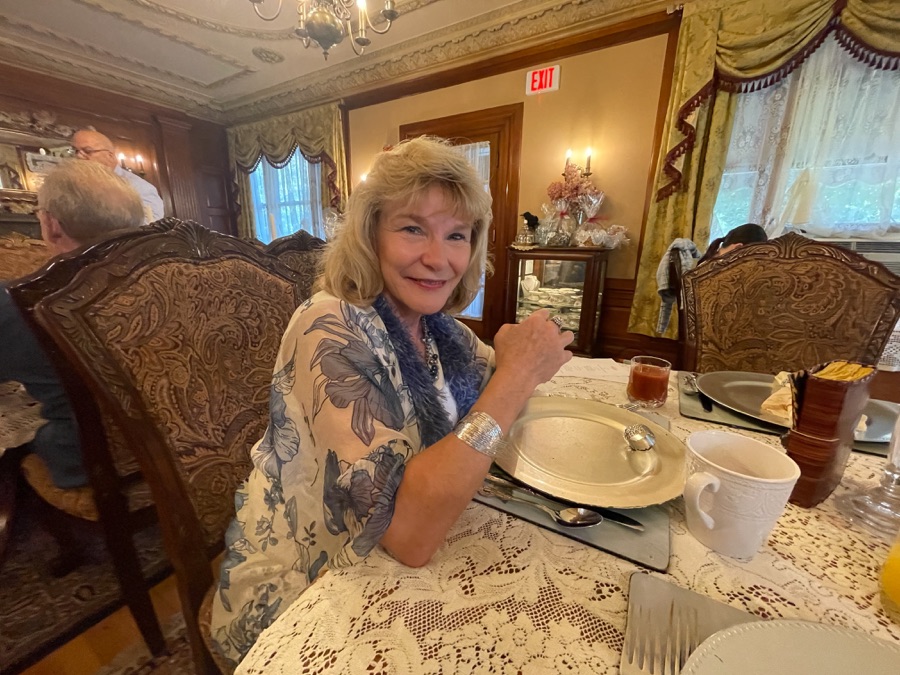
The dining room was empty when we got there.
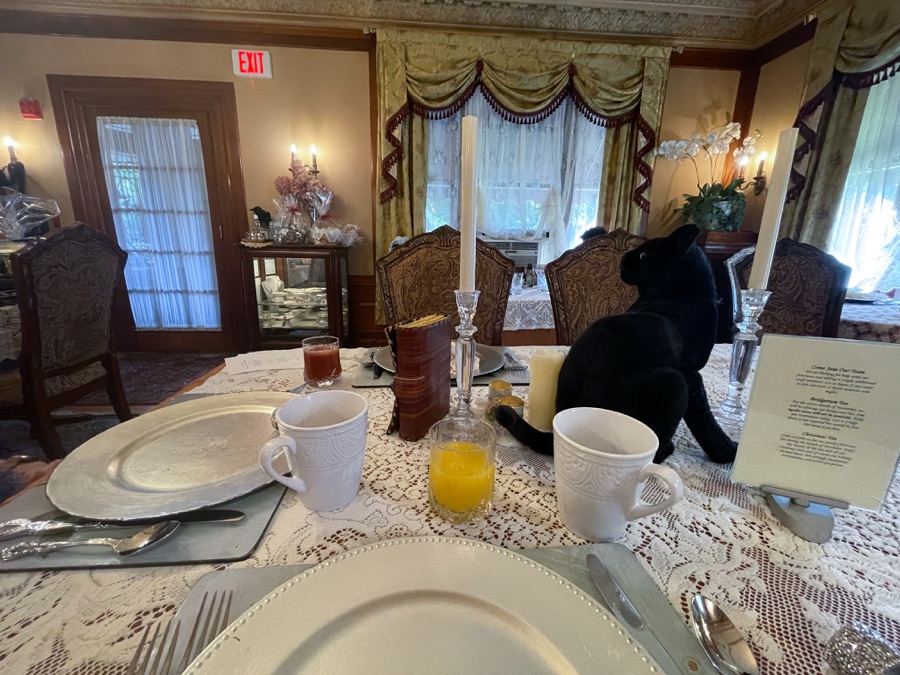
The menu changes every day.
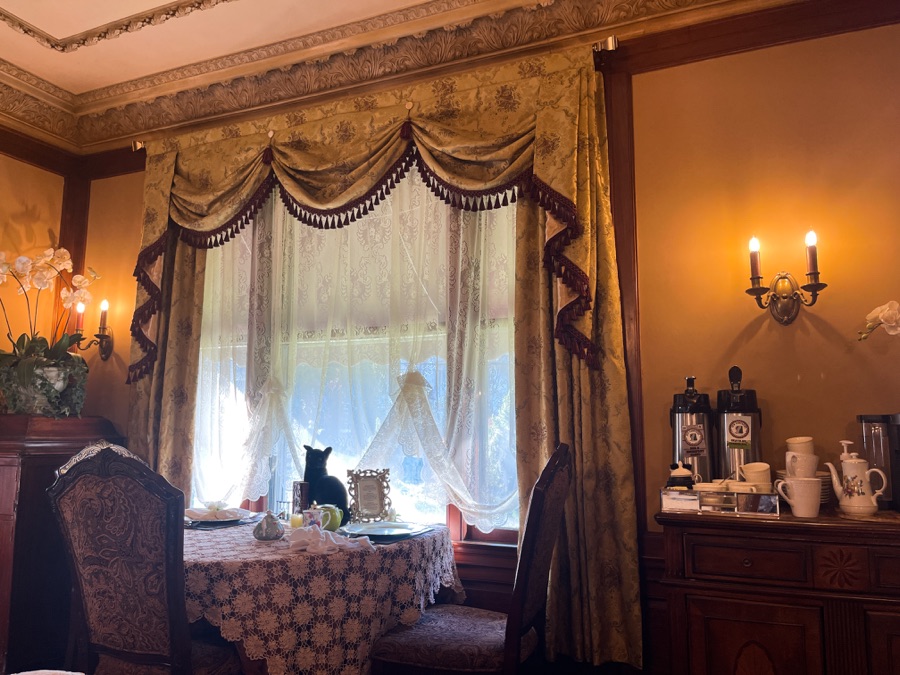
The cat has not moved all day long.
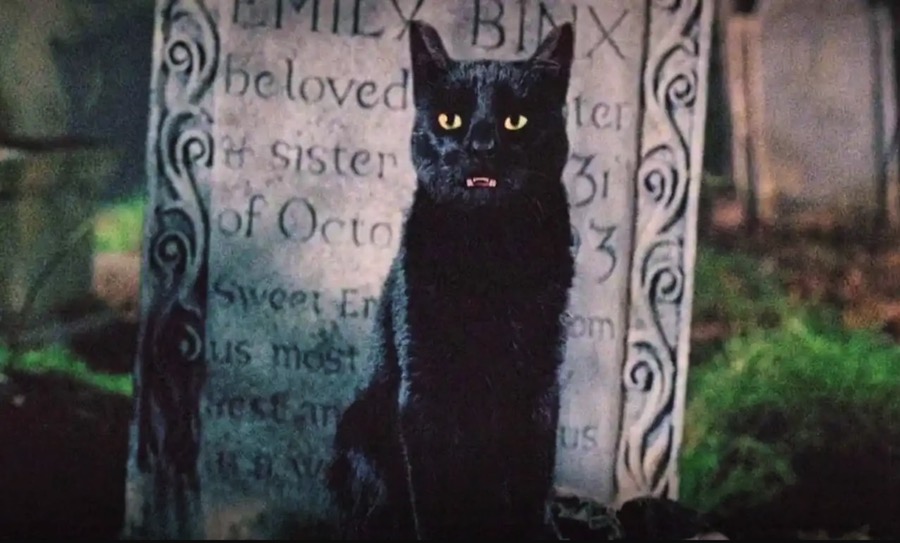
Binx from the movie, Hocus Pocus.
Did You Know? - Thackery Binx, the beloved character from the 1993 cult classic was an immortal talking cat. Voiced by Jason Marsden, the character was actually a 17th century boy who was transformed into feline form by the Sanderson Sisters. Acting as a guide for Max, Dani and Allison in the film, Binx helps save the day from the witches. He finally gets his spirit freed at the end.
 Waffles were amazing; pumpkin flavored.
Waffles were amazing; pumpkin flavored.
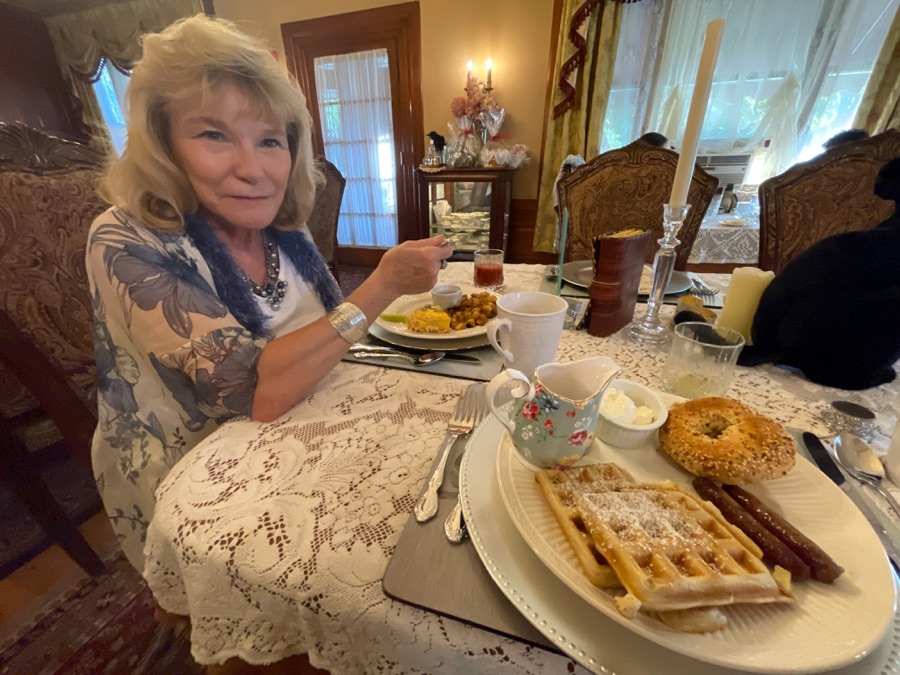
Mary selected eggs!


Off we go.

Did You Know? - BOSTON IS NAMED AFTER A TOWN IN ENGLAND - Many of the city's first settlers came from Boston, England and simply kept the name.

Difficult to jump off this bridge!
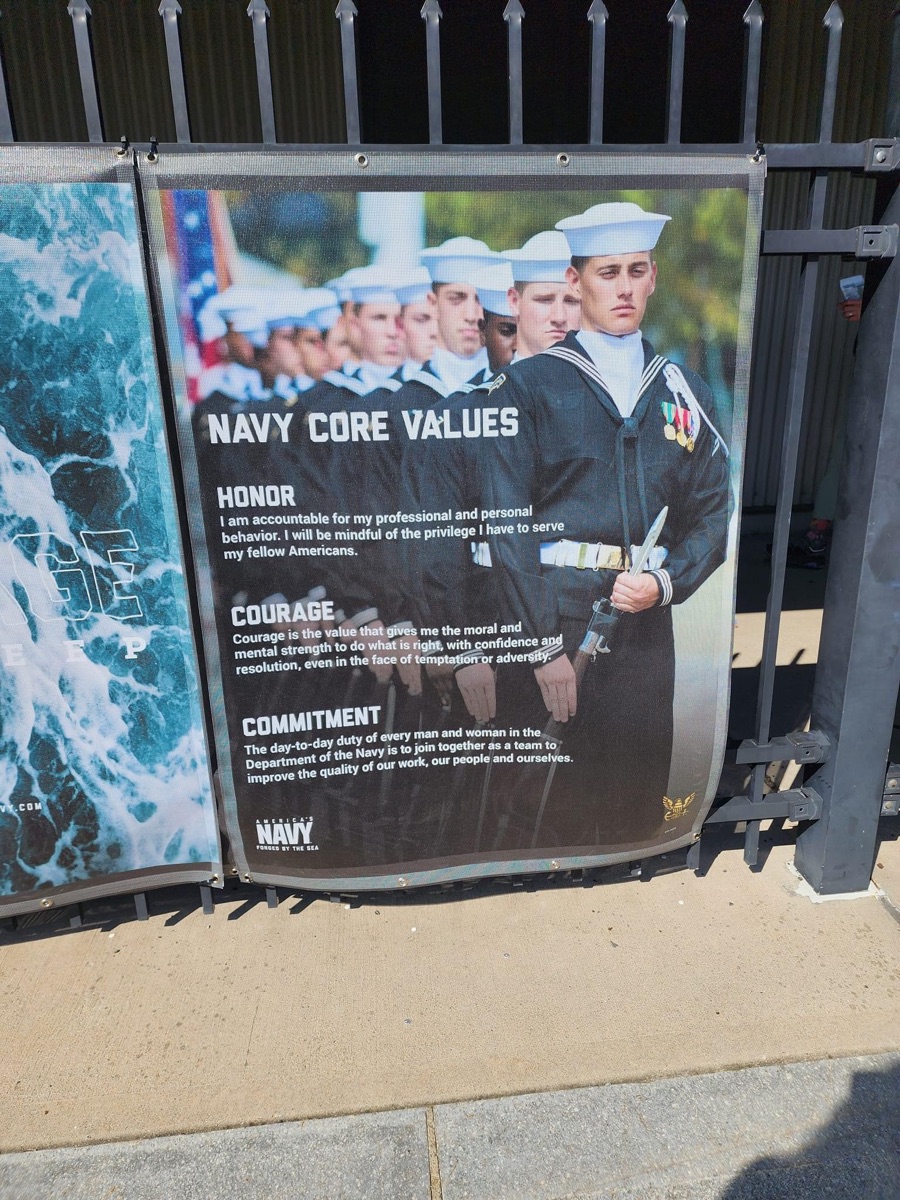
Oh dear! Core values again?
Did You Know? - REVERE BEACH WAS THE COUNTRY'S FIRST PUBLIC BEACH - This lovely stretch of sand was established in 1896.
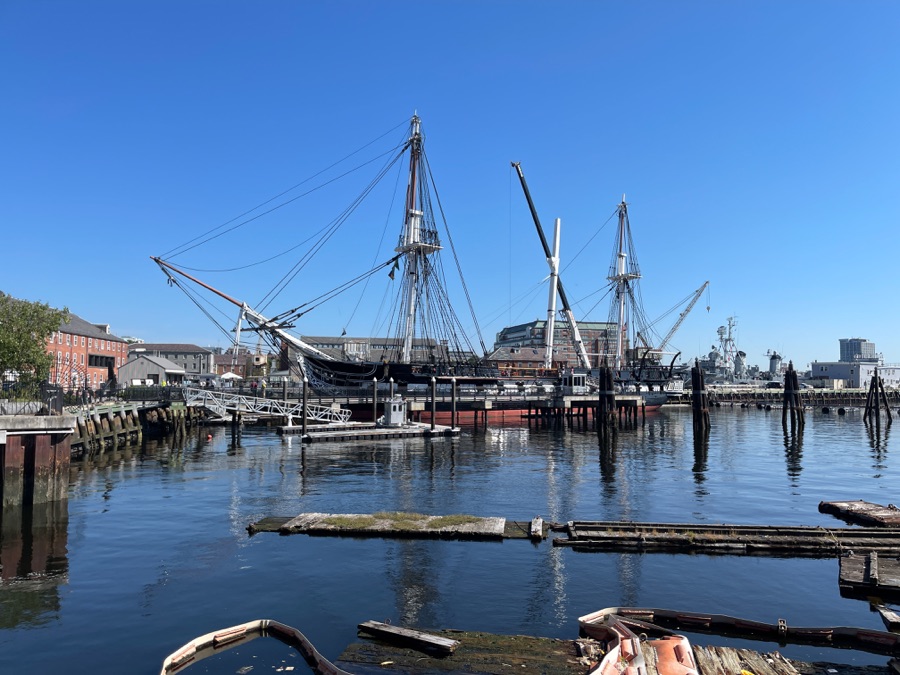
Old Ironsides came into view from the parking lot.
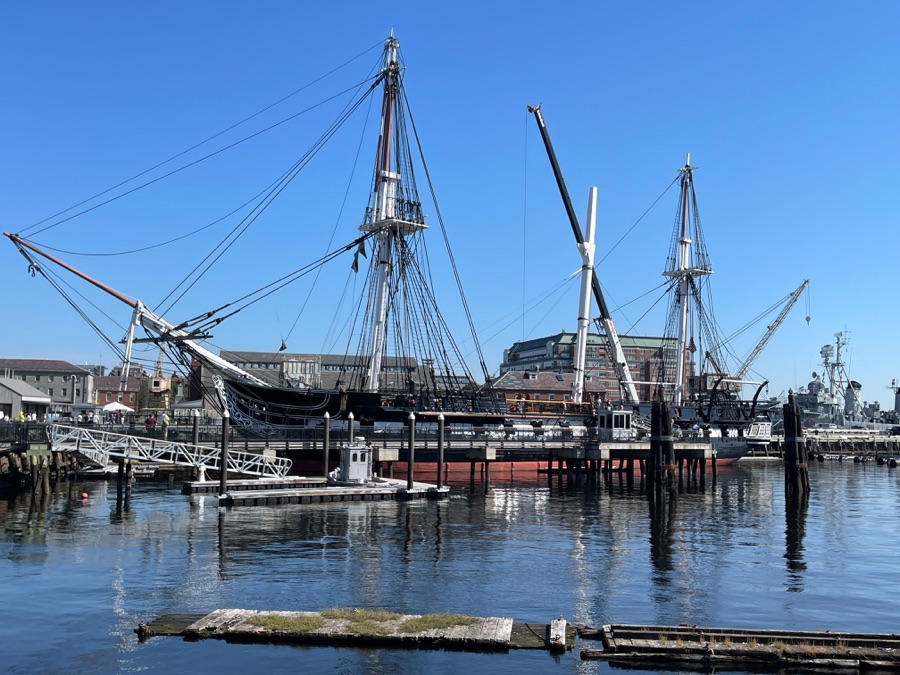
She was magnificent.
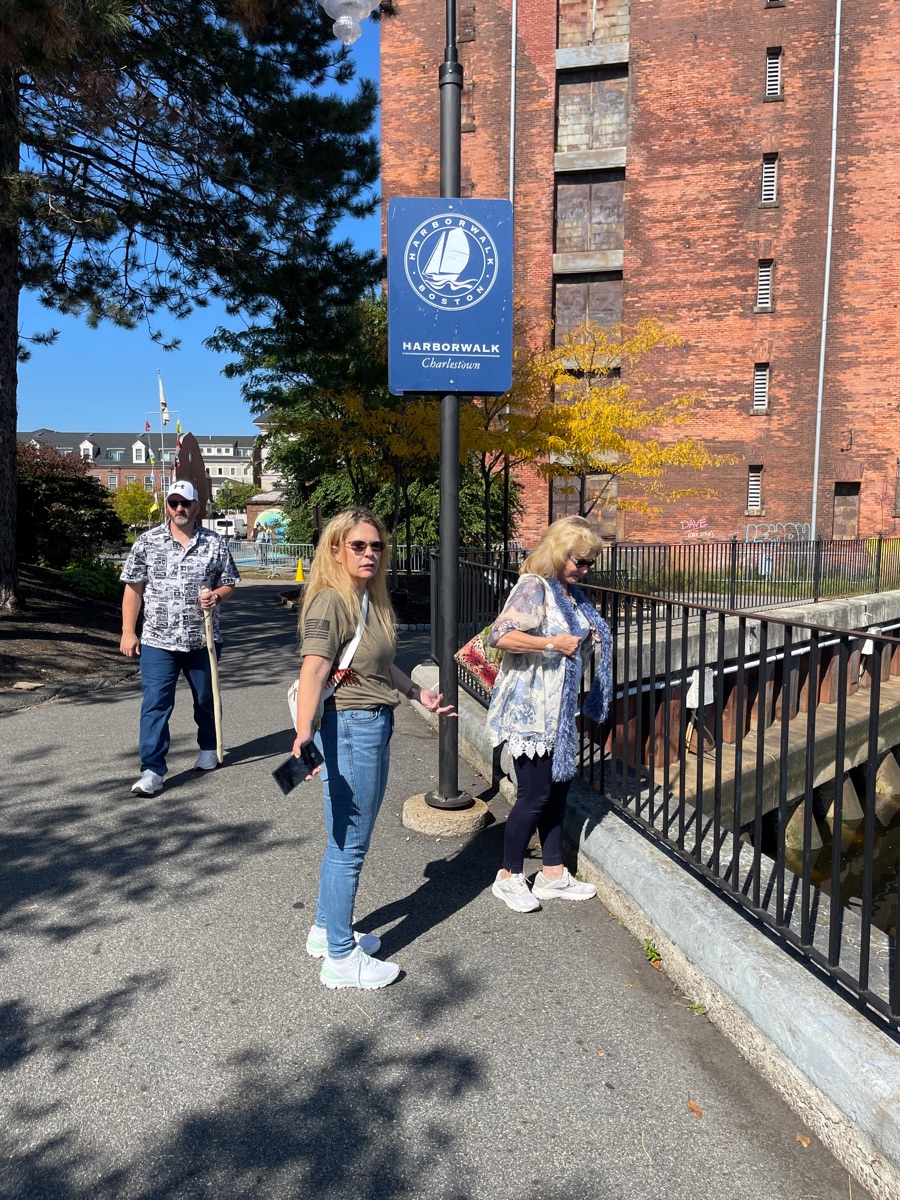
The parking meters used Internet so Colleen kept getting notices from them about how much the parking was - and it was a lot!

We are ready to explore.
Did You Know? - BOSTON BUILT AMERICA'S FIRST SUBWAY IN 1897 - The Tremont Street Subway is also the third in the world to use electric traction.

Harbor walk was quite nice but not in the winter.
Did You Know? - A near-continuous, 43-mile linear park along Boston's shoreline, the Harborwalk connects Boston's waterfront neighborhoods to Boston Harbor and each other. Nearing completion, it stretches from the Neponset River in lower Dorchester to Constitution Beach in East Boston via Charlestown, the North End, Downtown, Seaport, South Boston and Dorchester.
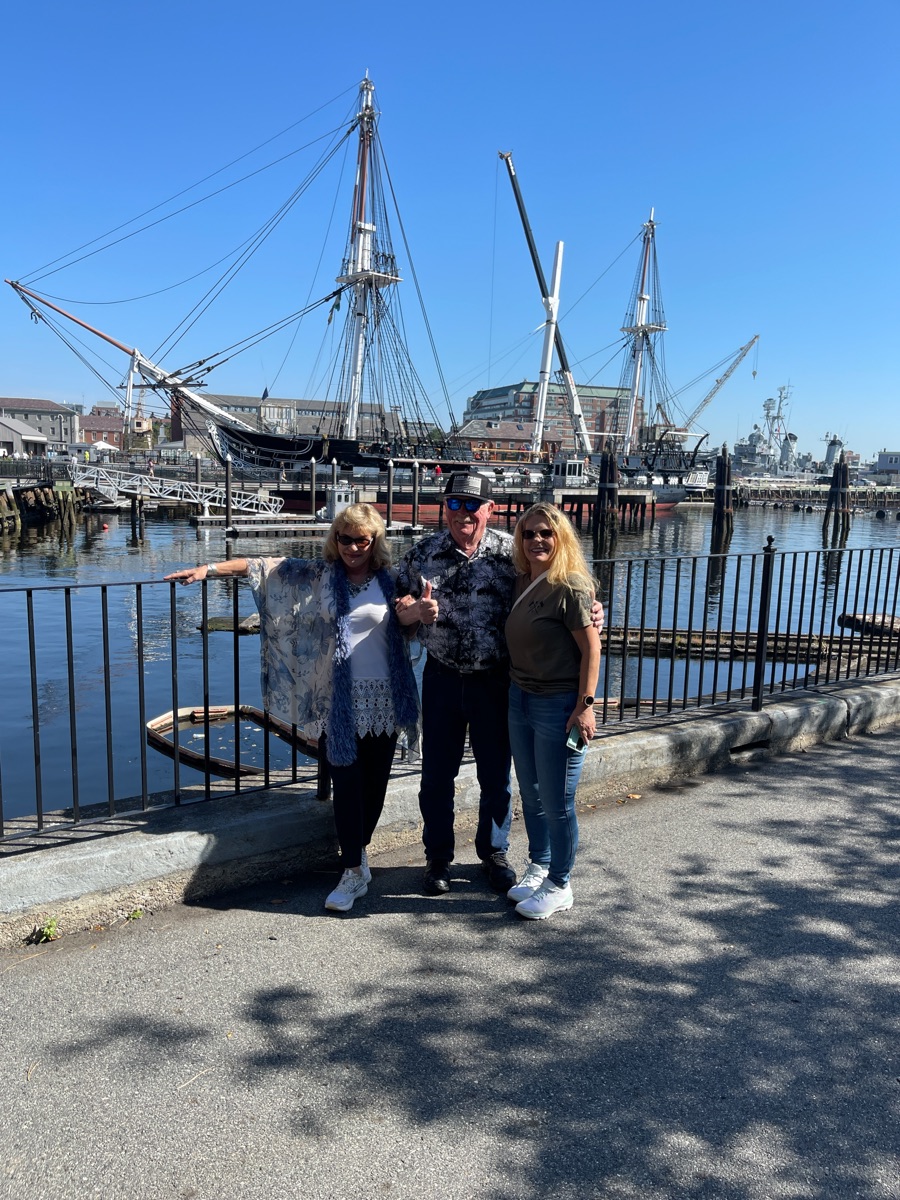
We are getting closer.
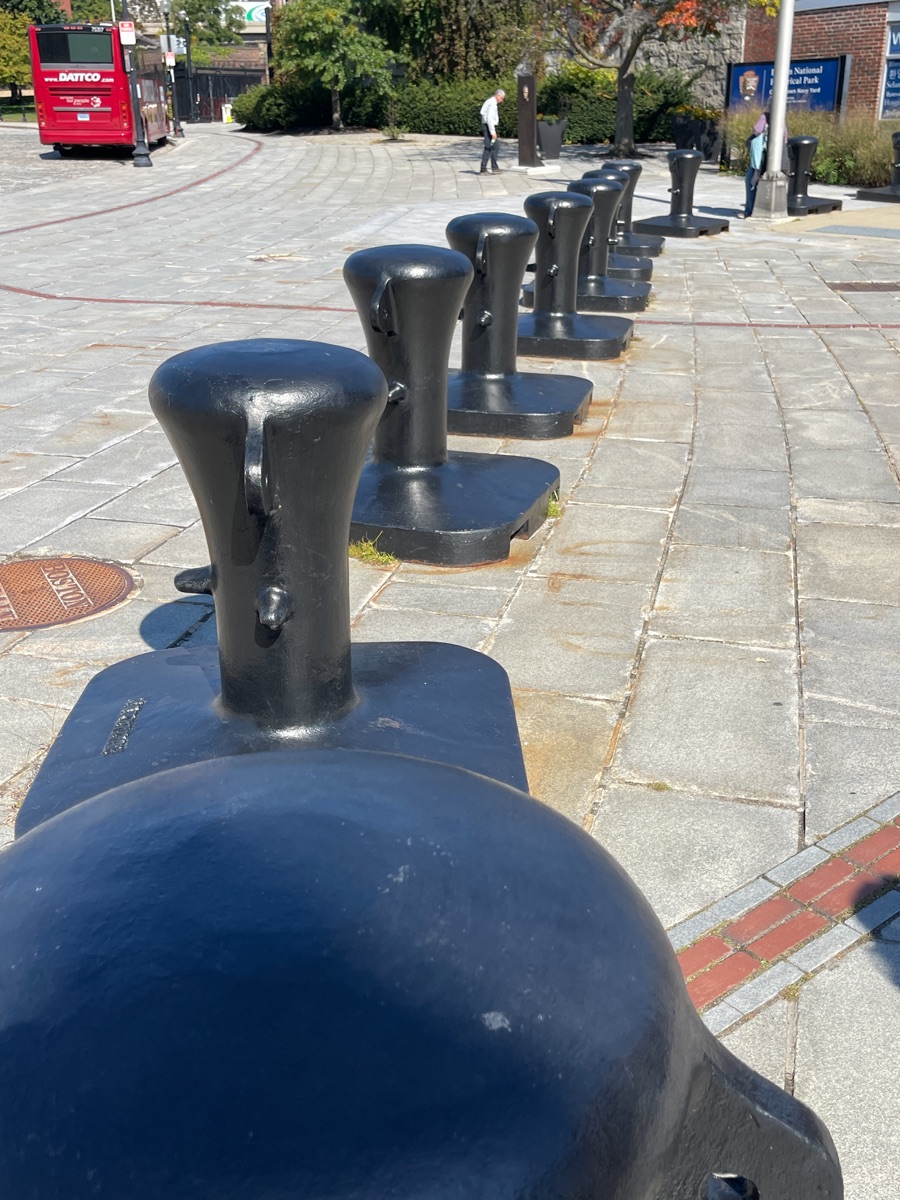
Tie me up!
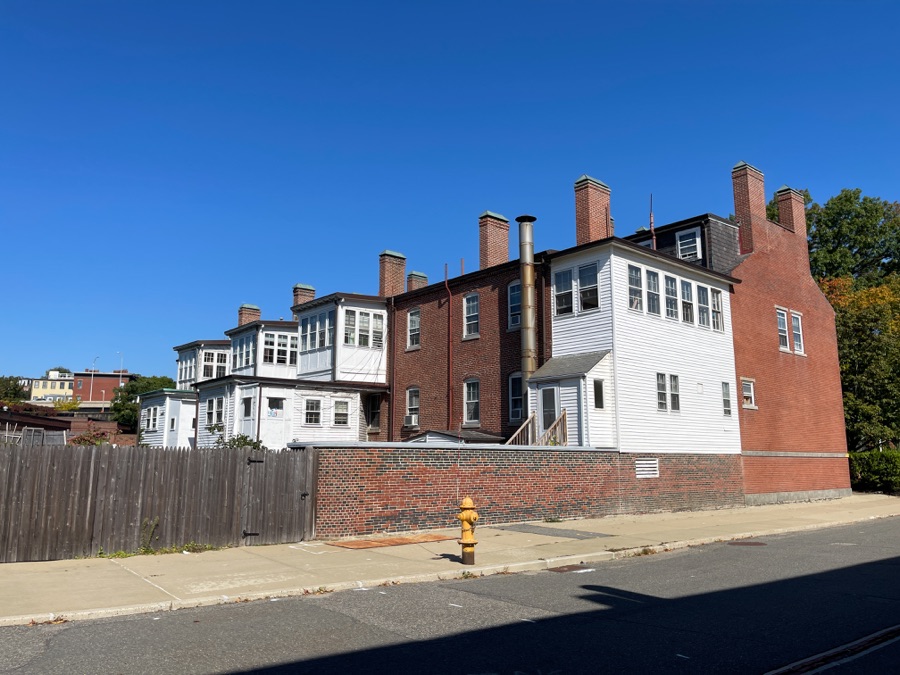
The buildings are old Navy offices from years gone by!
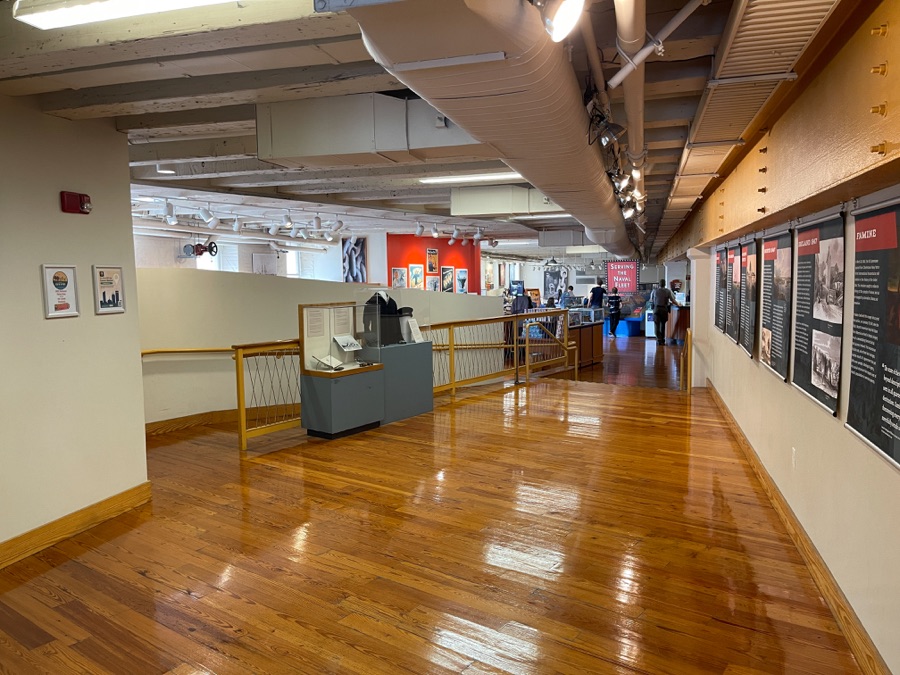
The ticket office has the consummate tourist baubles and beads.
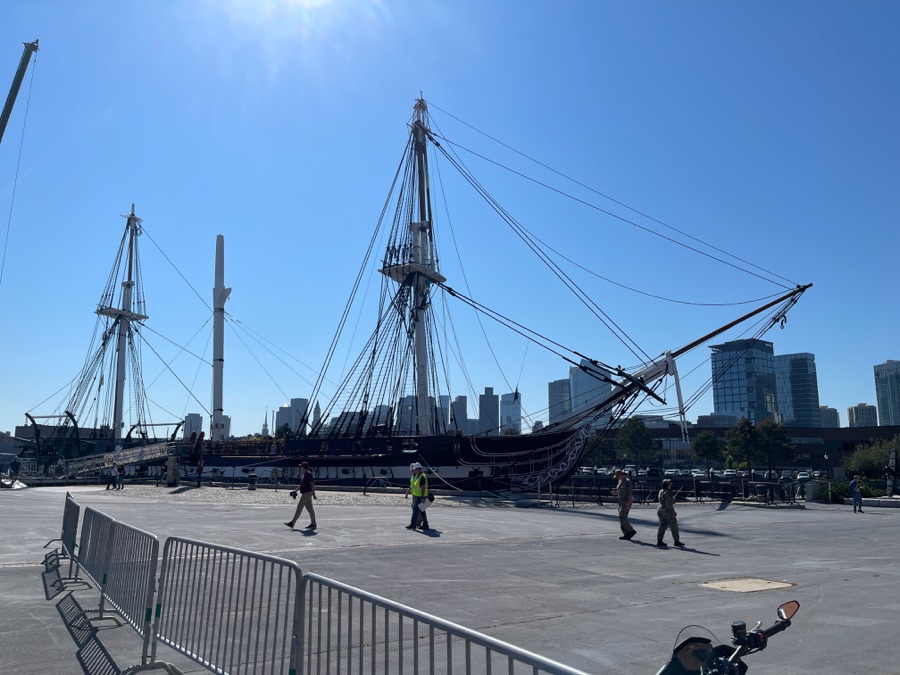
Maintained in its 1812-era configuration, access to USS Constitution is limited to visitors who can safely walk aboard the Ship's top (spar) deck unassisted. Access to the below decks requires climbing and descending steep ladder-like steps

The ship is over 200 years old and requires constant maintenance.
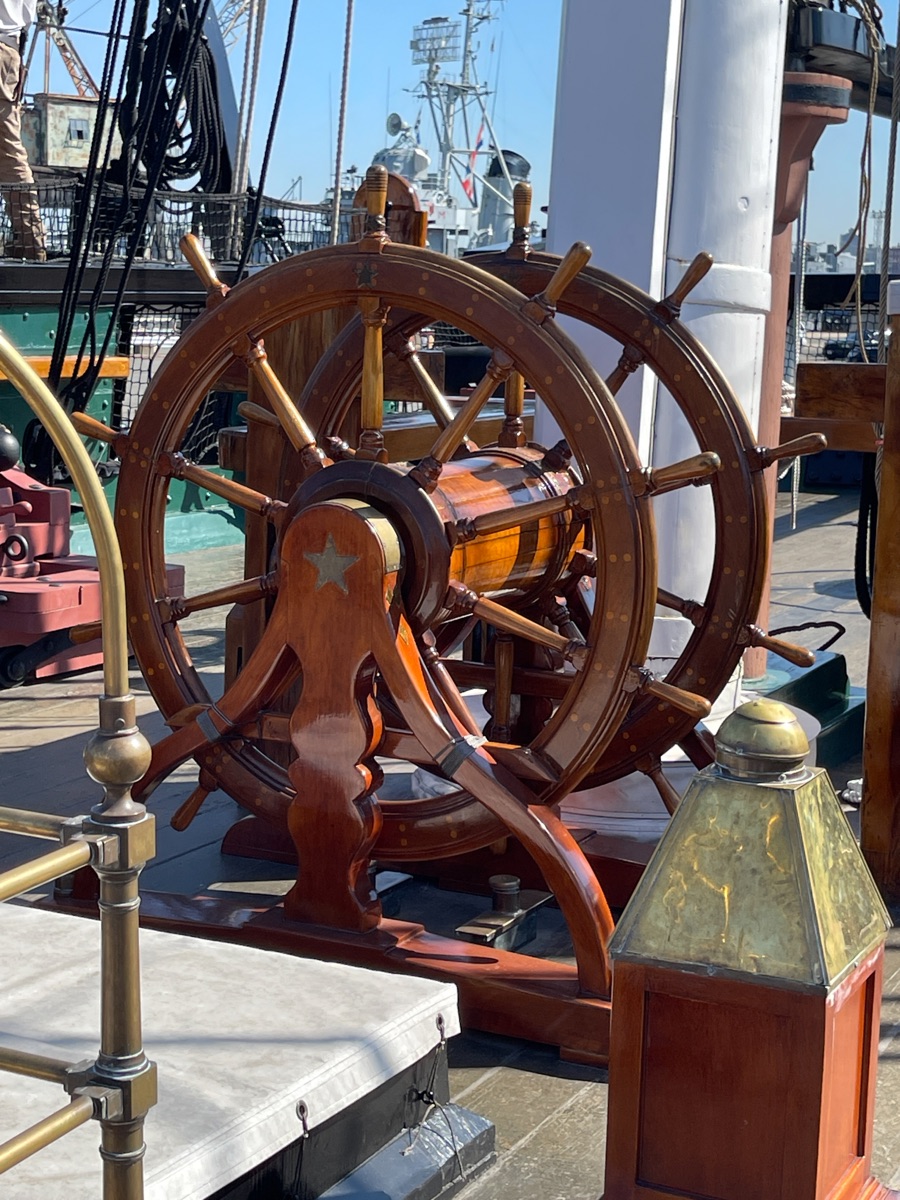
The captain of the Emerald Princess would have loved this!

Ready, aim, fire!

I read everything plus I was dressed for the season.
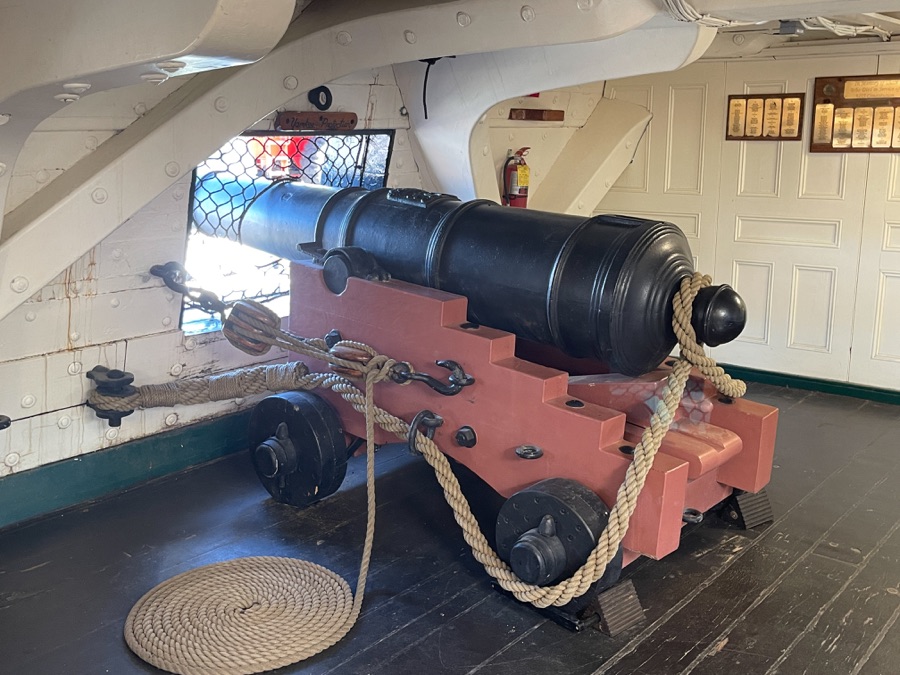
These puppies did a lot of damage in their heyday!
Did You Know? - It has all its cannon and caronnades, but they are not the originals. Those were melted down when the Constitution was made into a barracks ship. However, in an awe inspiring act of magnanimity, the Royal Navy supplied the equivalent guns that were about to be destroyed because they were long obsolete.
They donated them to the US when the Constitution was restored. If you take the tour of the Constitution you will see all the guns marked with letters "GR" for "George's Rex" by the touch hole.
When the Constitution's guns were cast they were cast in America. They'd never bear the proof mark of the King of England. Consider how amazing this gesture was from a nation who had been America's sworn enemy just 50 years previously.
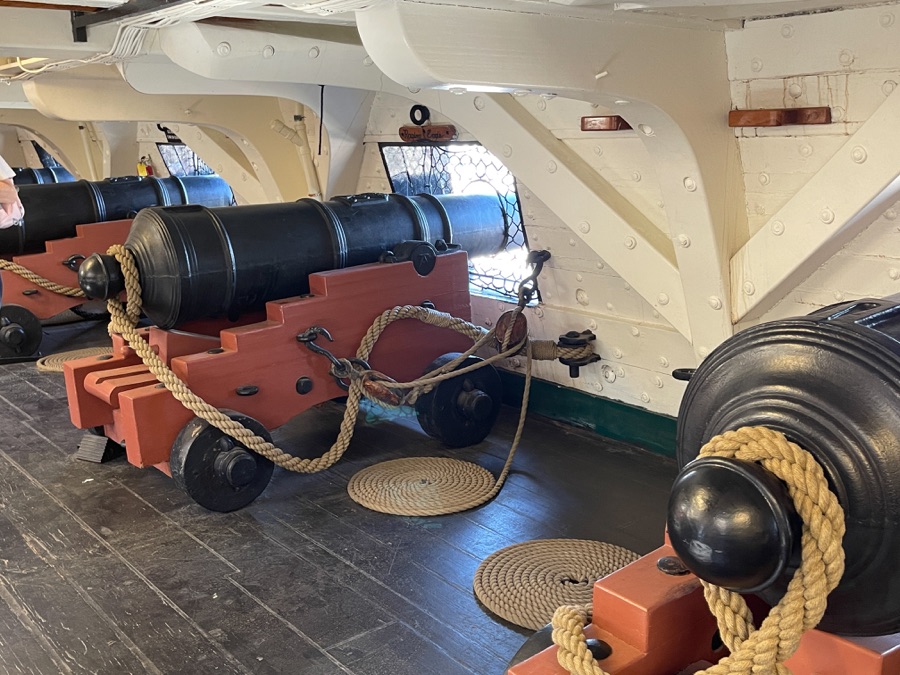
They required a seven man crew to load, aim and fire.
Did You Know? - One of the signal guns is fired every morning and evening when the flag is raised and lowered. Naturally since the Navy Yard has gentrified over the past thirty years a number of useless yuppies have begun to complain about the noise. The big guns are fired every year when the ship is turned around in Boston Harbor at Castle Island. The Royal Irish Artillery fires back from the battlements. (NOTE: Screw the Yuppies!!)
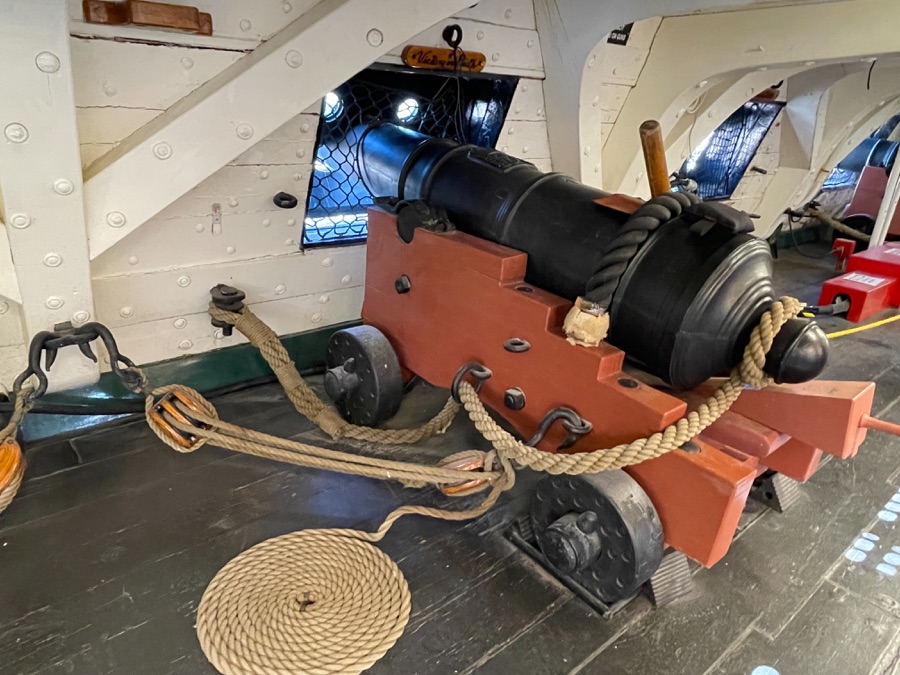
Forty pounders do a lot of damage.
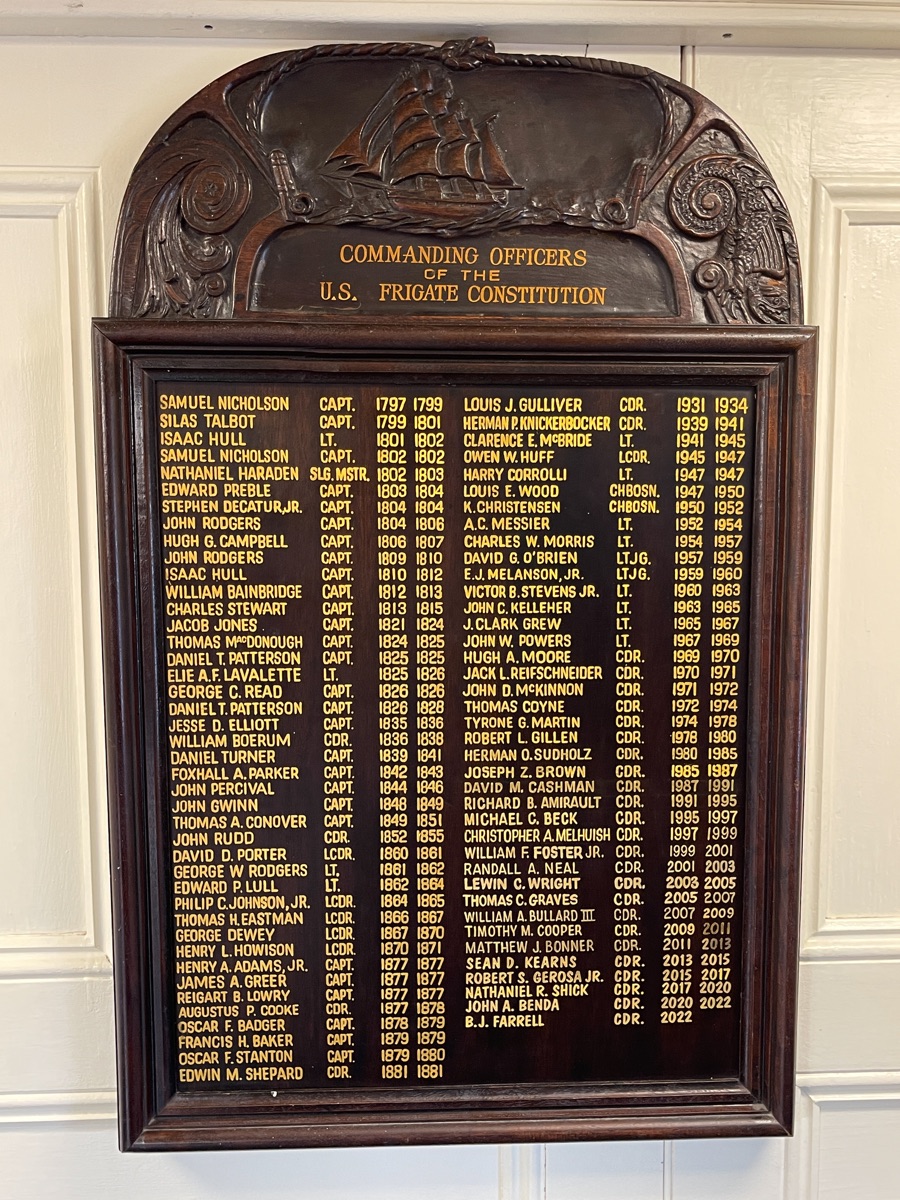
Many a good soul!
By today's standards, how good of a warship is the USS Constitution? - If you mean by today's retrospection, 1797 Frigates like USS Constitution are still considered an excellent ships by the standards of the time. She had the flexibility of a frigate but had the power & protection to overwhelm other small vessels while avoiding larger ones.
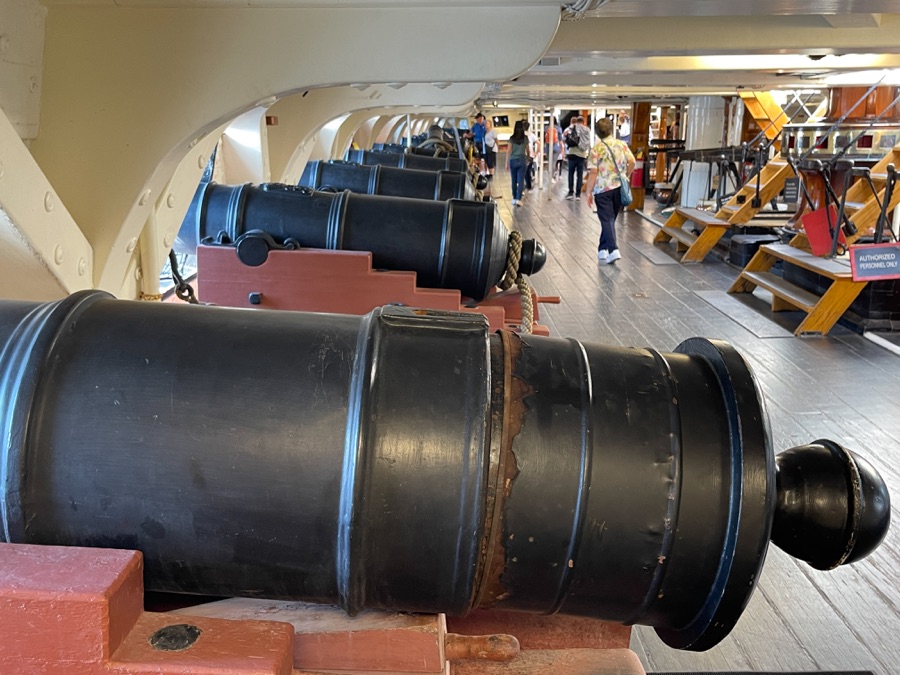
This was a busy place in a battle.
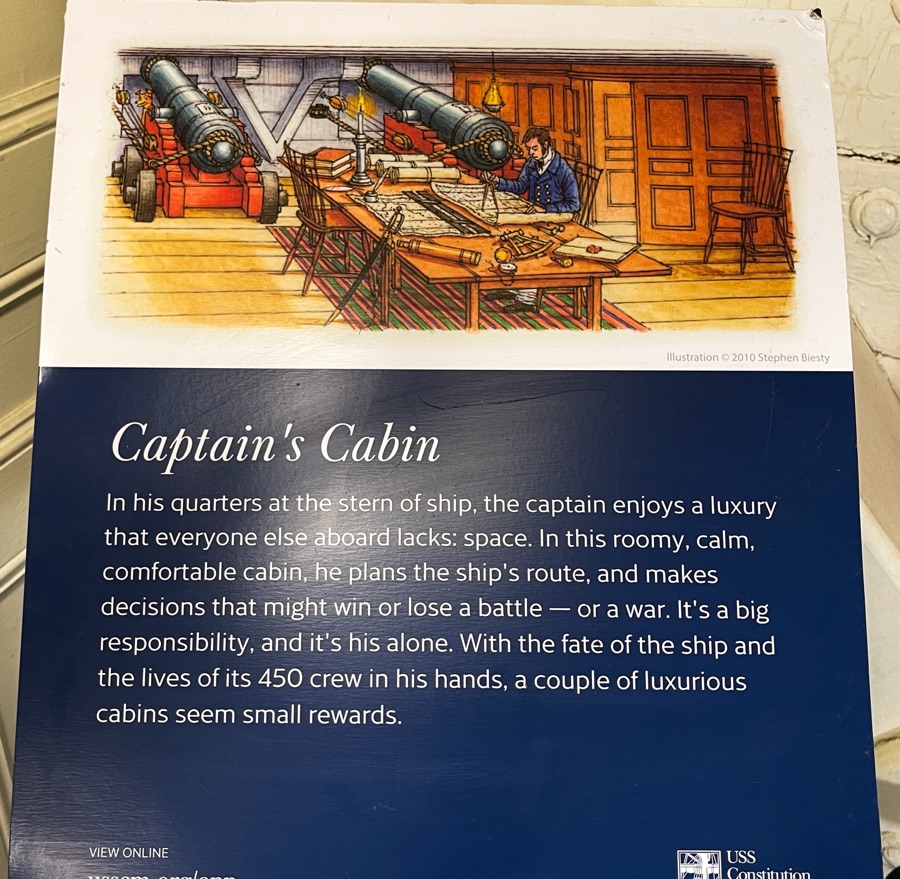

There is Cuba in the mirror!
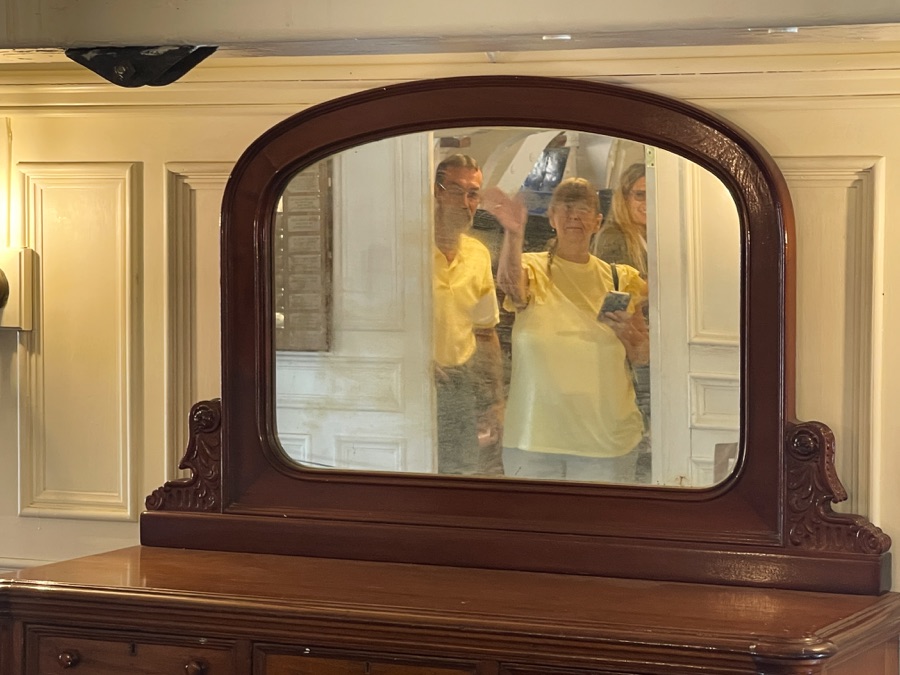
Saying hello... or is it a ghost?
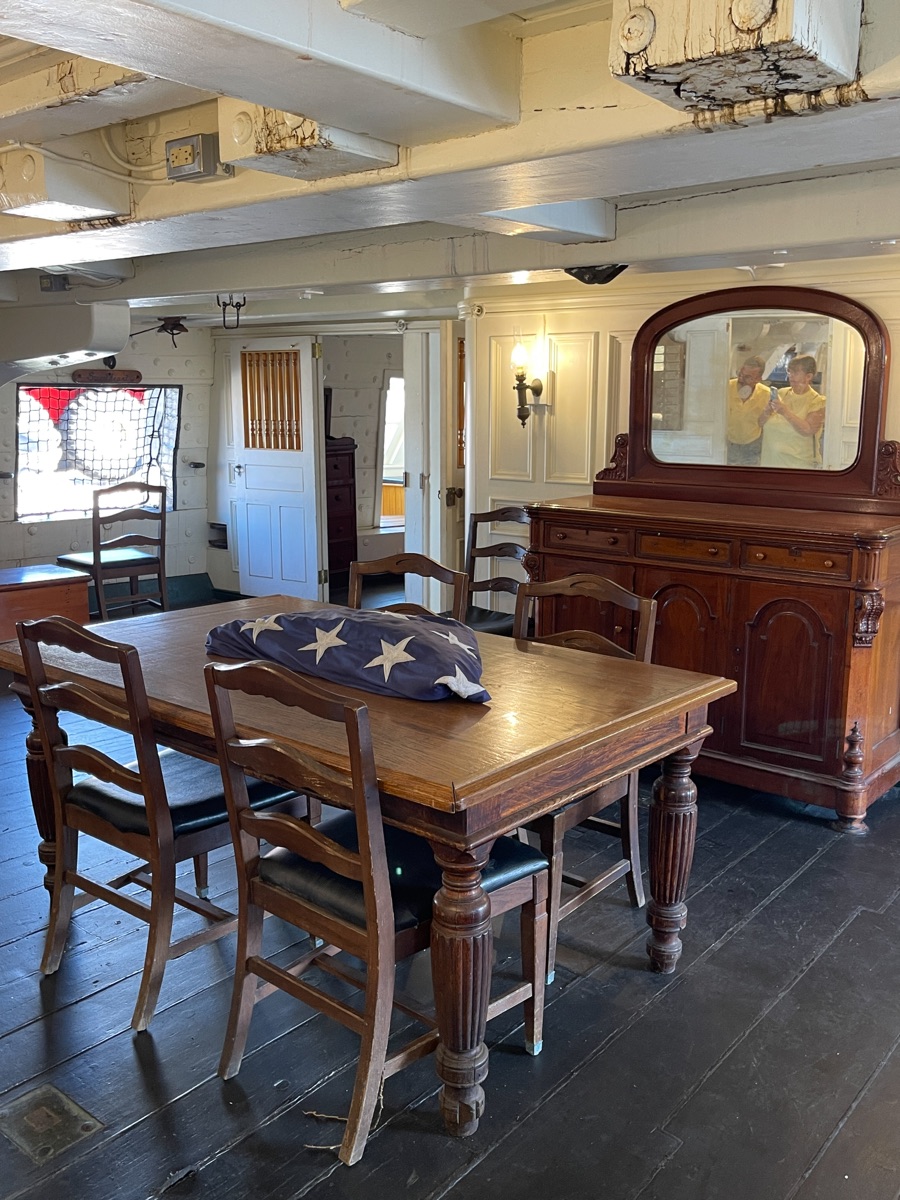
The cabin was quite large but it served many purposes.
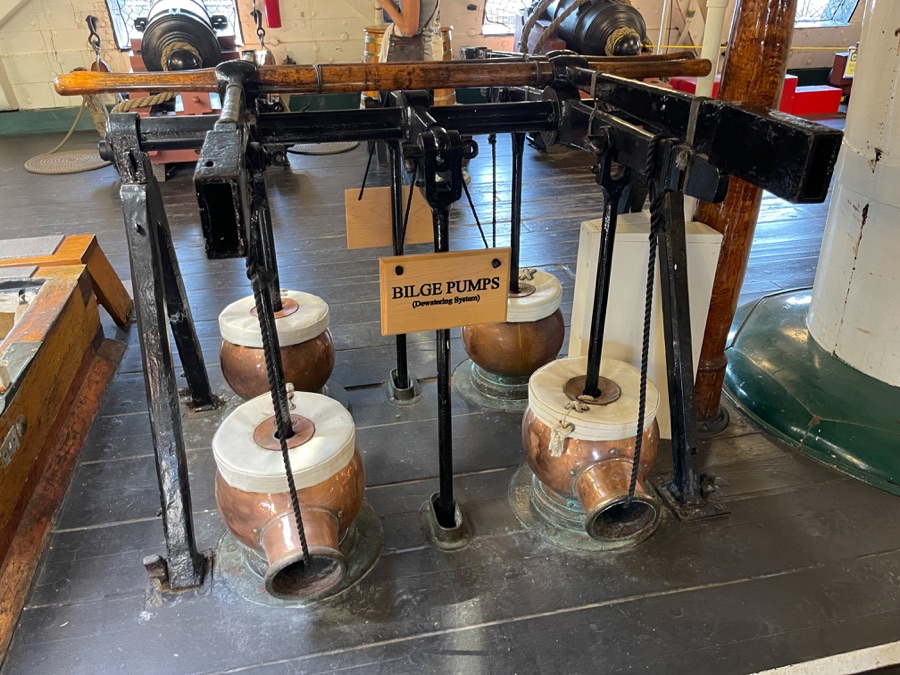
The bulge had to be pumped out on a regular basis, manually.
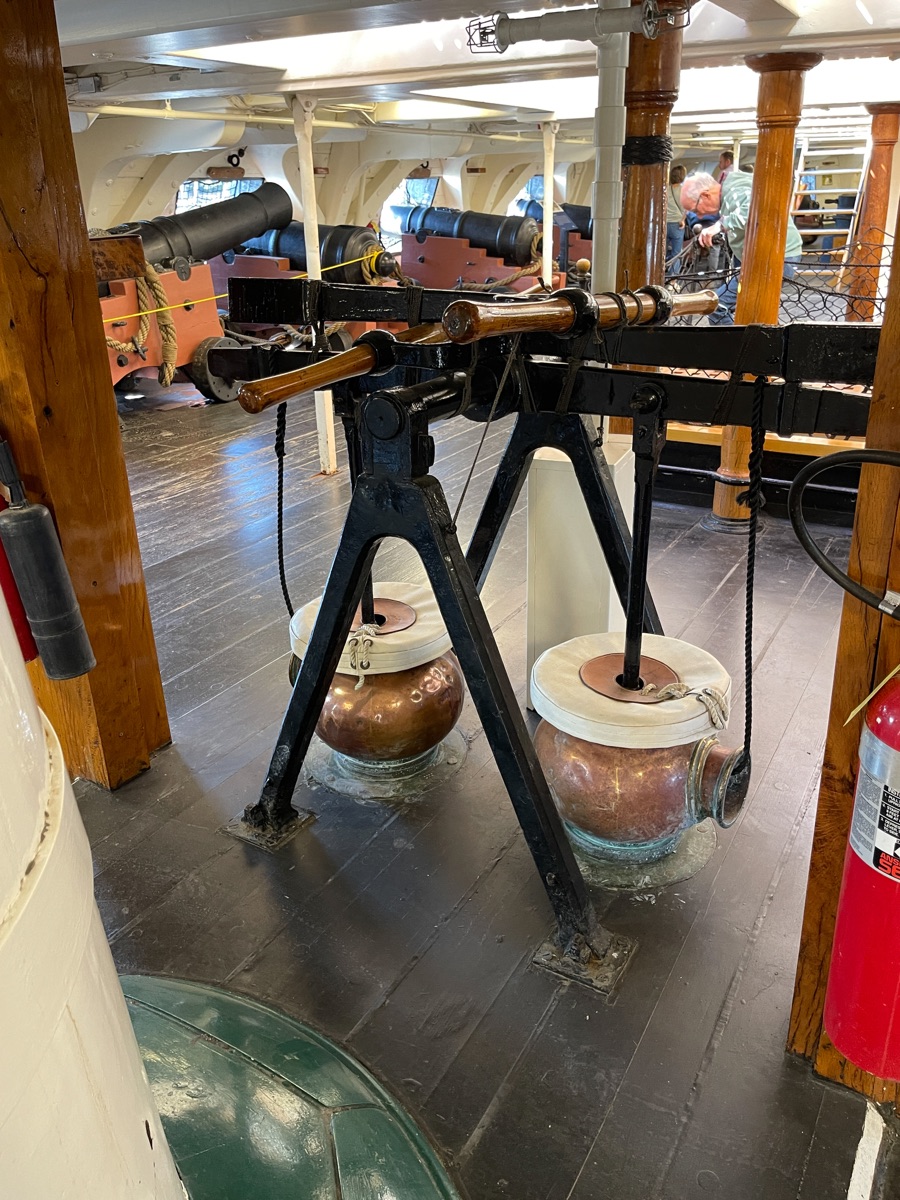
The fluids went out on the deck and down the drains located on the side of the ship!
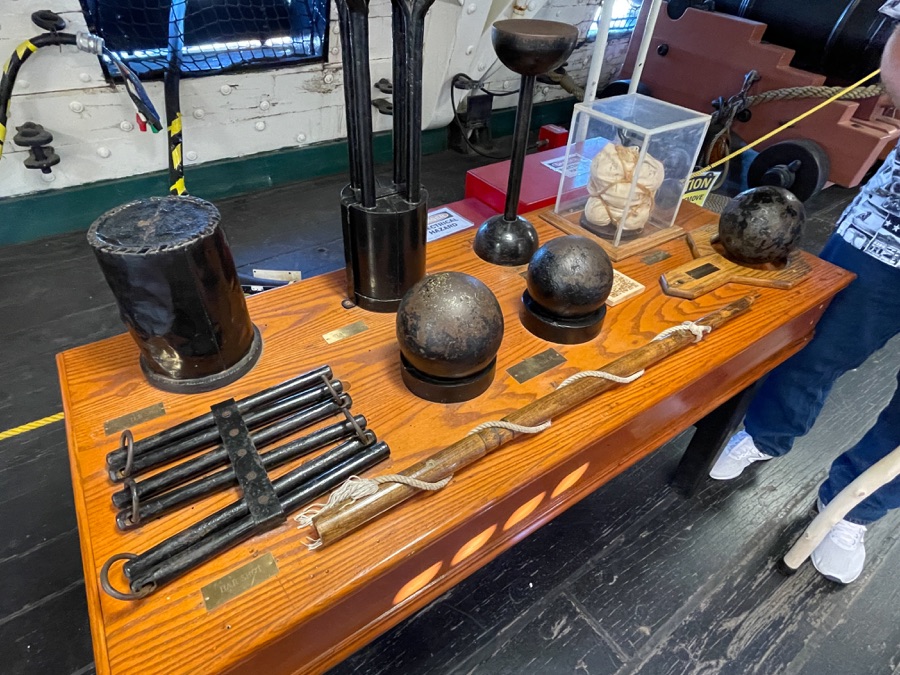
The cannons has a wide selection of ammunition!
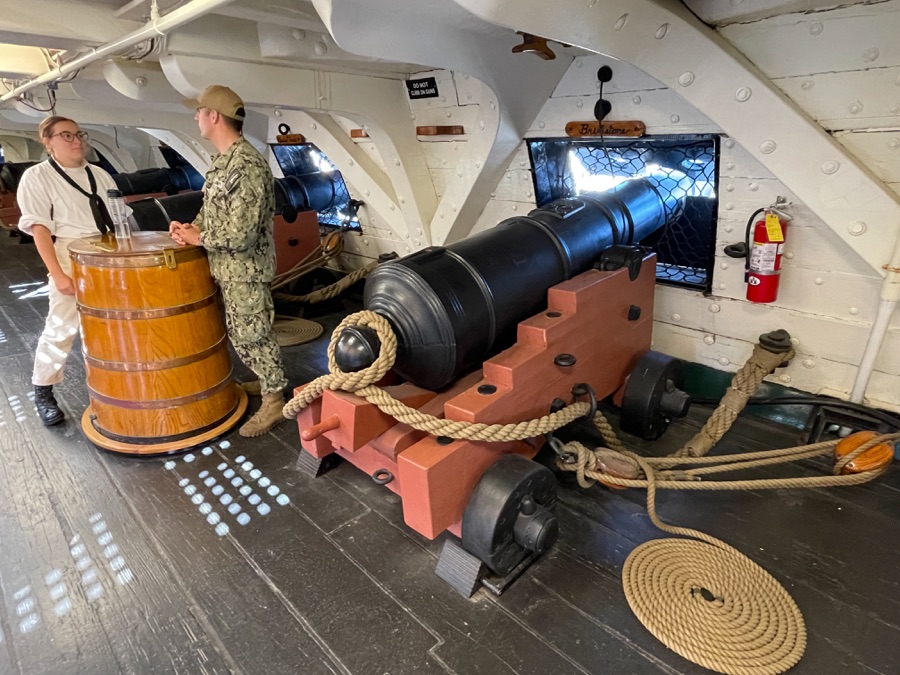
These crew members are active USN and served on board; this is an active ship!
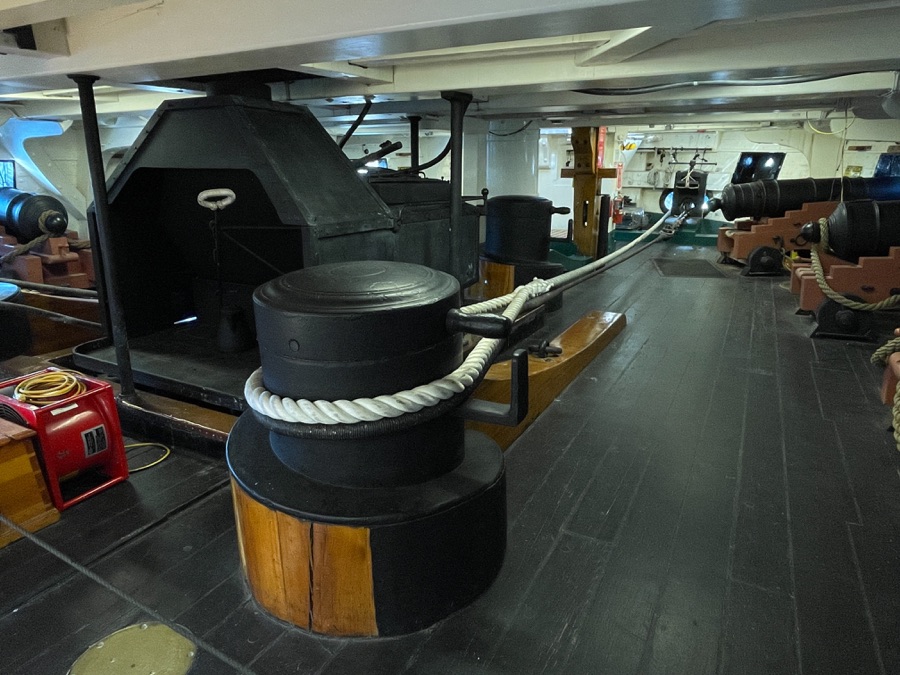
The kitchen was downstairs and well protected from the surrounding wooden items.
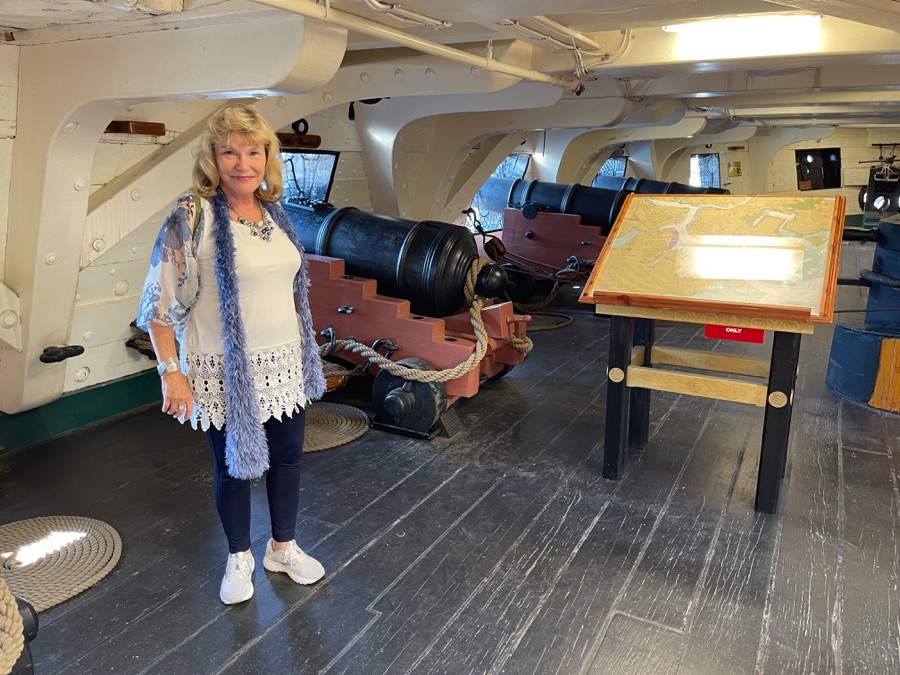
Mary examines the guns and the map of the bay; planning an attack?

The bedrooms were NOT private!
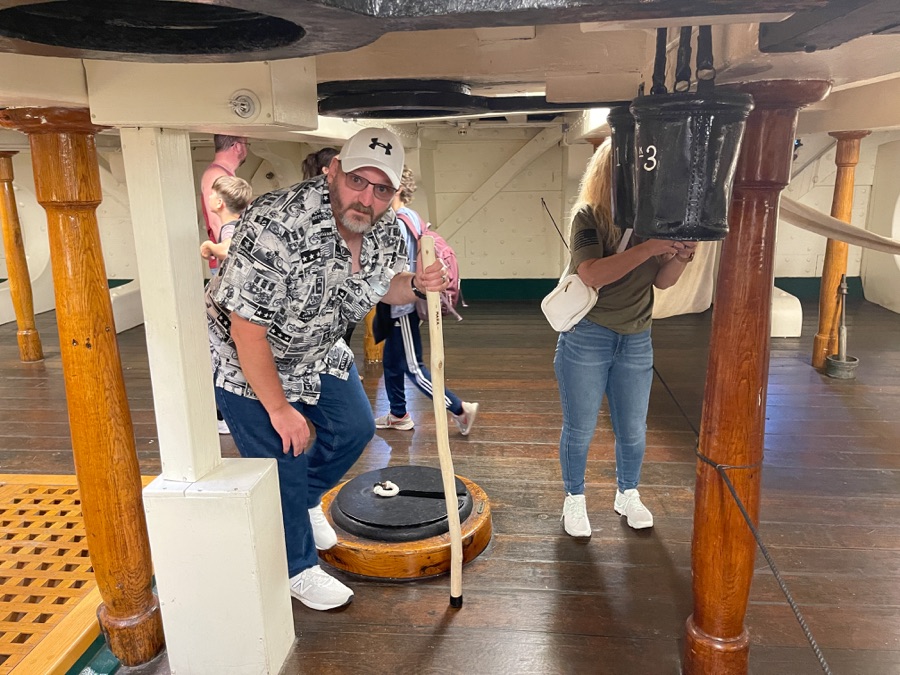
People were smaller in those days!

Mark and I had to duck the entire time.
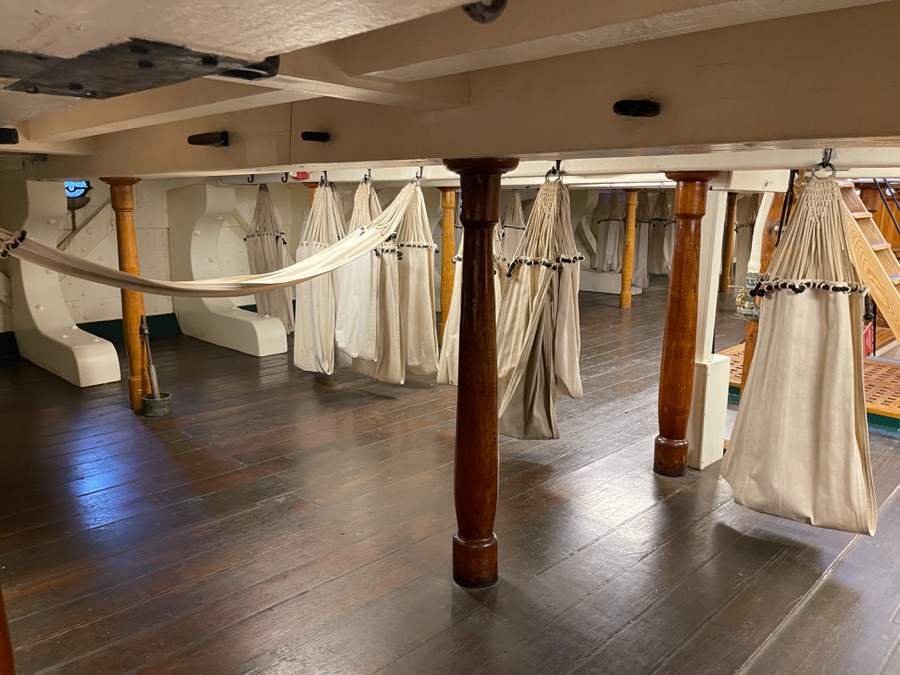
The hammocks looked like ghosts!
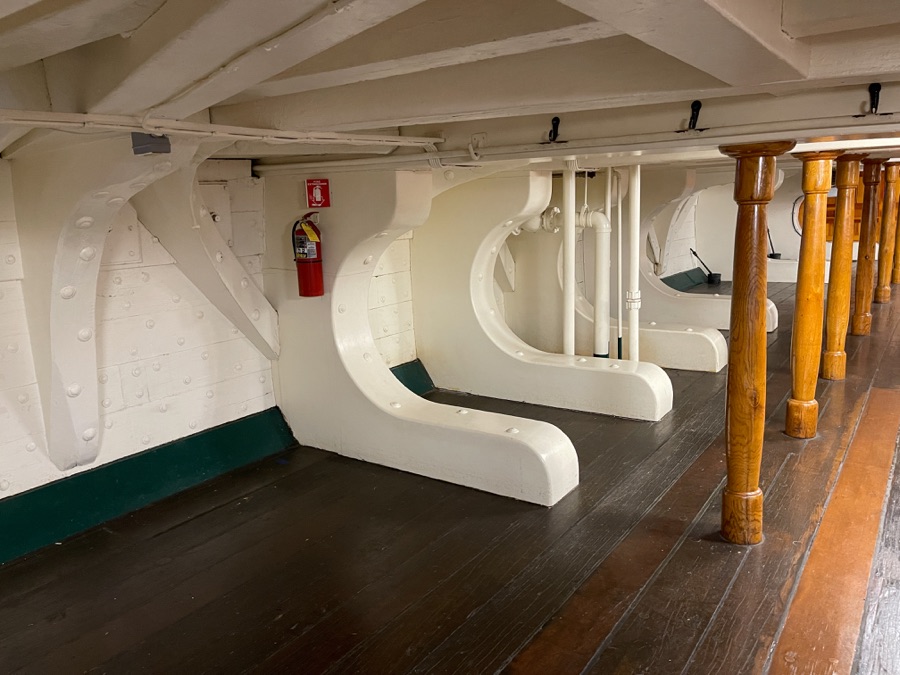
No wonder they called it "Ironsides"
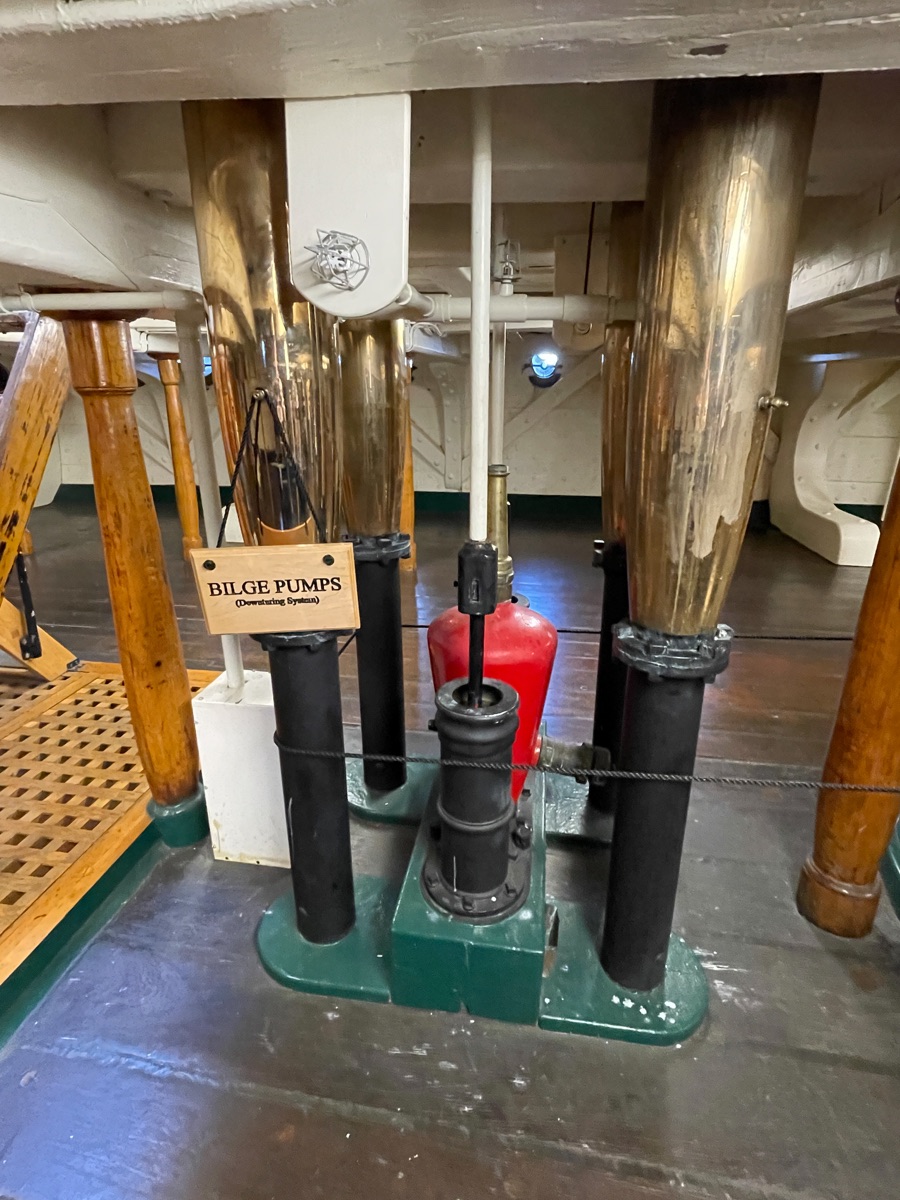
Additional pumps on the gun deck!
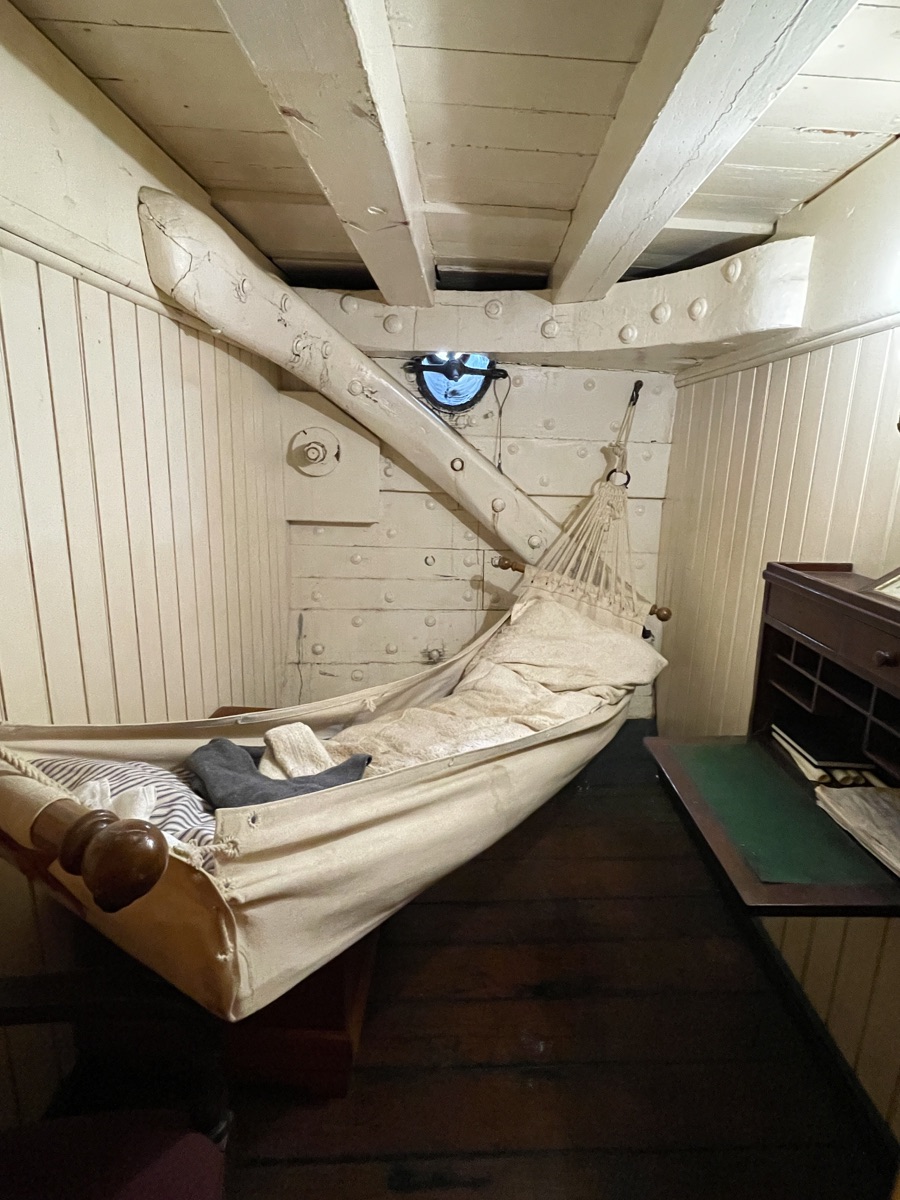
The junior officers cabins were small!

Not even a window!

Mary was amazed at the size of the masts.
Did You Know? - The Constitution had three masts — fore, main, & mizzen. Its a ship rigged frigate. The term mast was applied to those vertical structures from which were swiveled horizontal timbers such as yards, booms, or gaffs used to support the sails.
A ship was a three-masted vessel fitted with square sails on all of its masts. The sizes were: foremast: 198 ft (60 m) mainmast: 220 ft (67 m) mizzenmast: 172.5 ft (52.6 m). Read more about the masts!
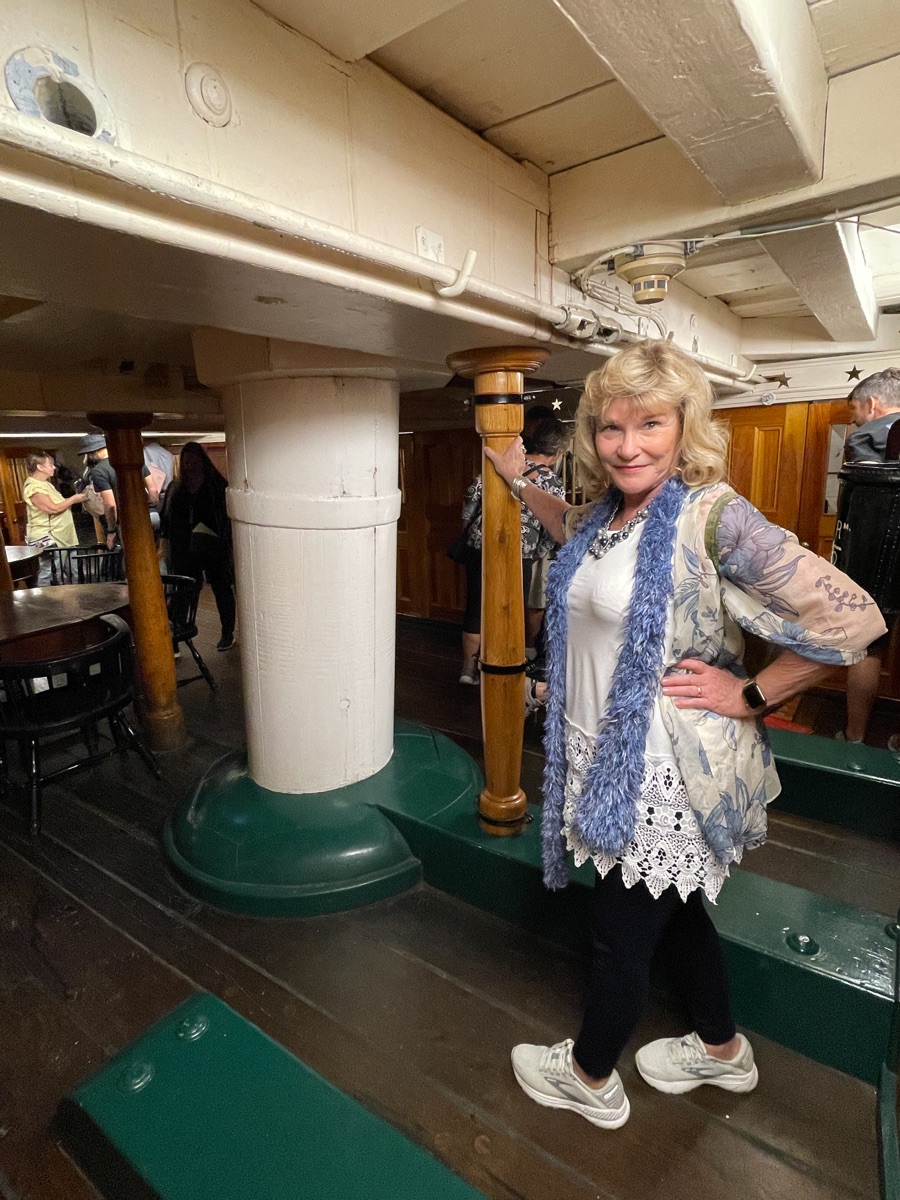
That's a lot of wood.

A placer we would NOT want to be during a battle!
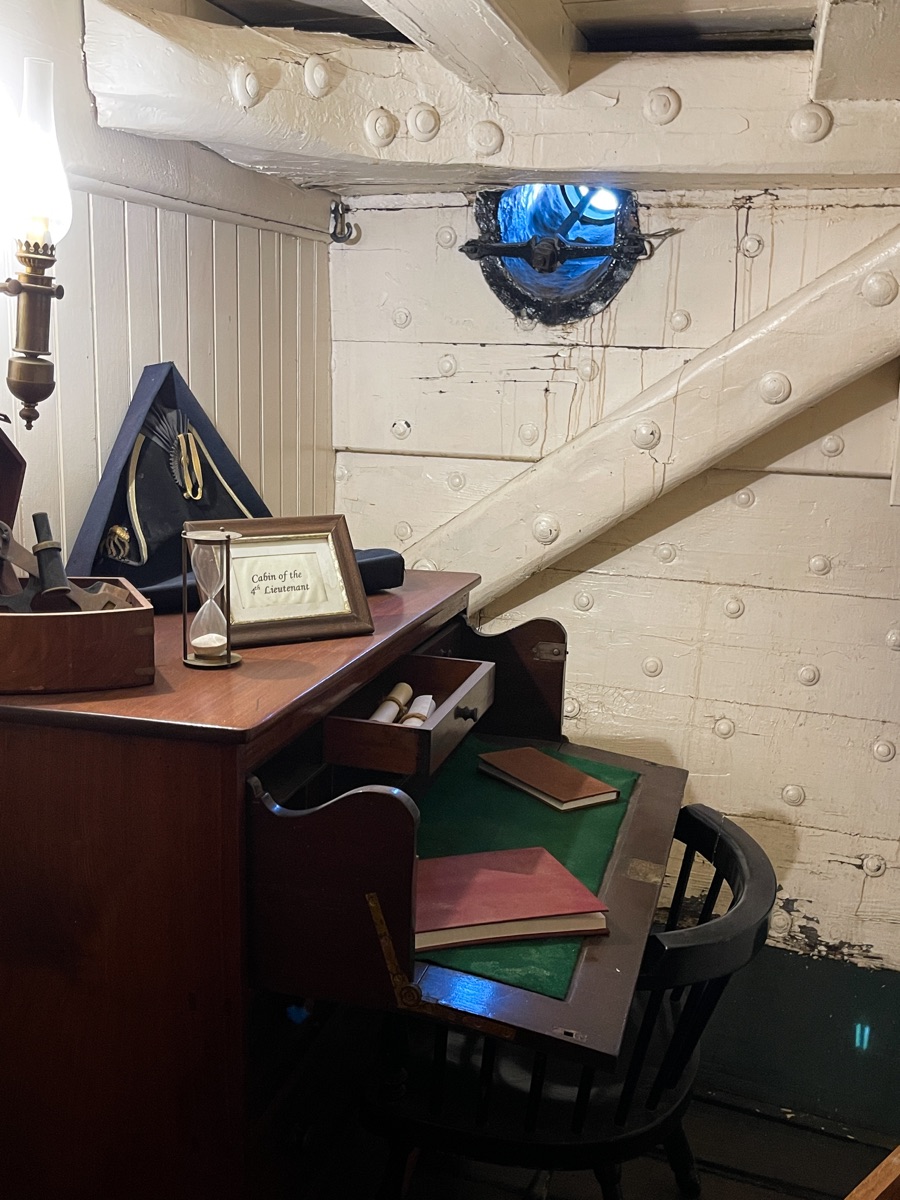
The furniture was quite well put together.


The grate was used to provide light to the lower decks in addition to fresh air.
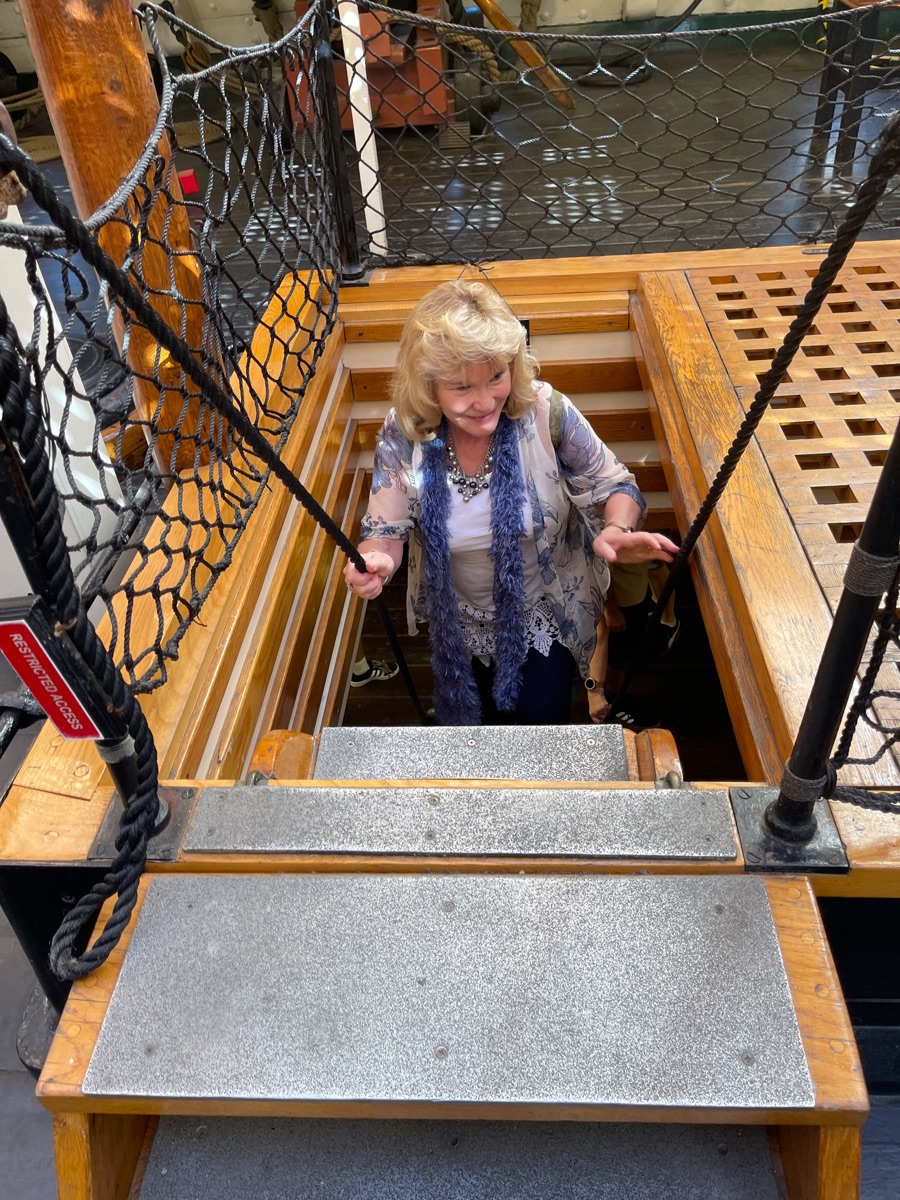
Mary had no problems going up and down the stairs.

Lighting from above!
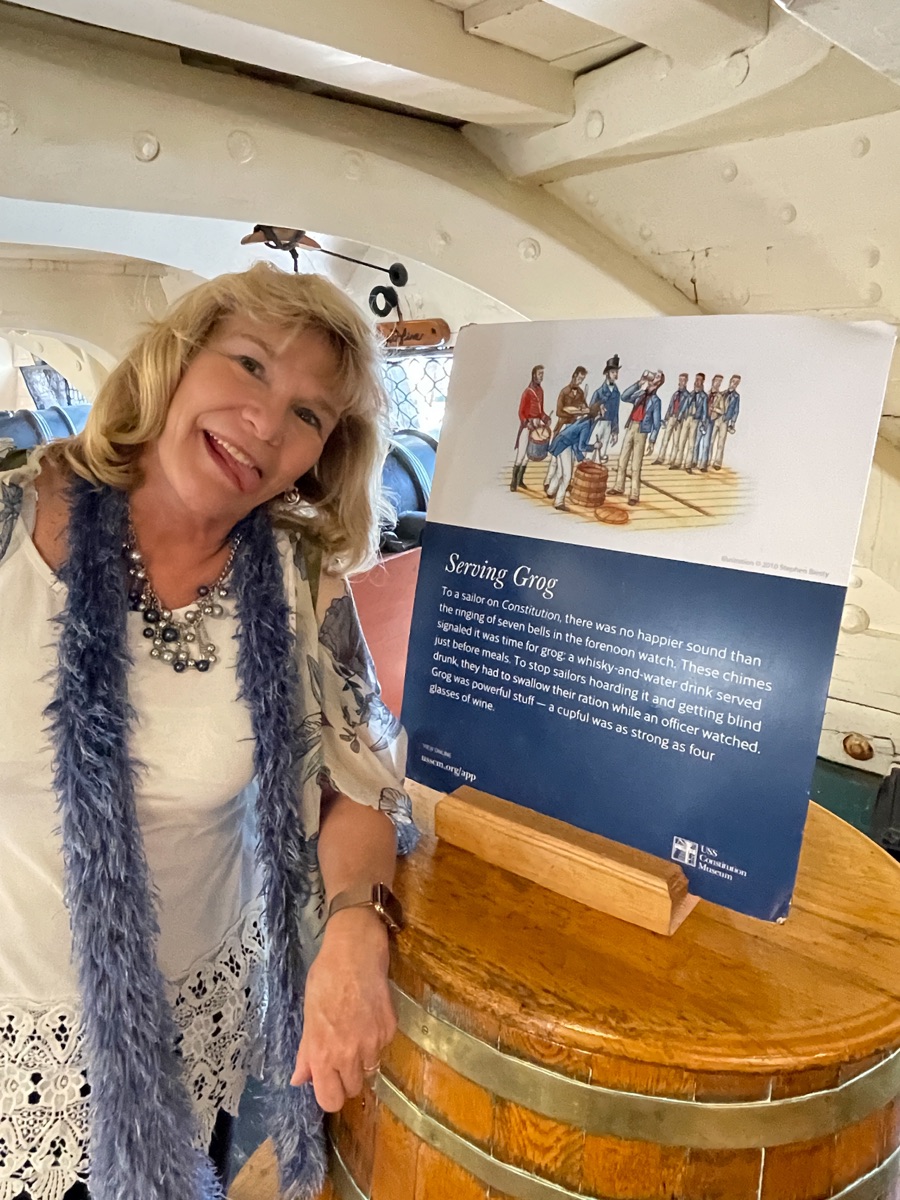
"hic!"

Good idea!
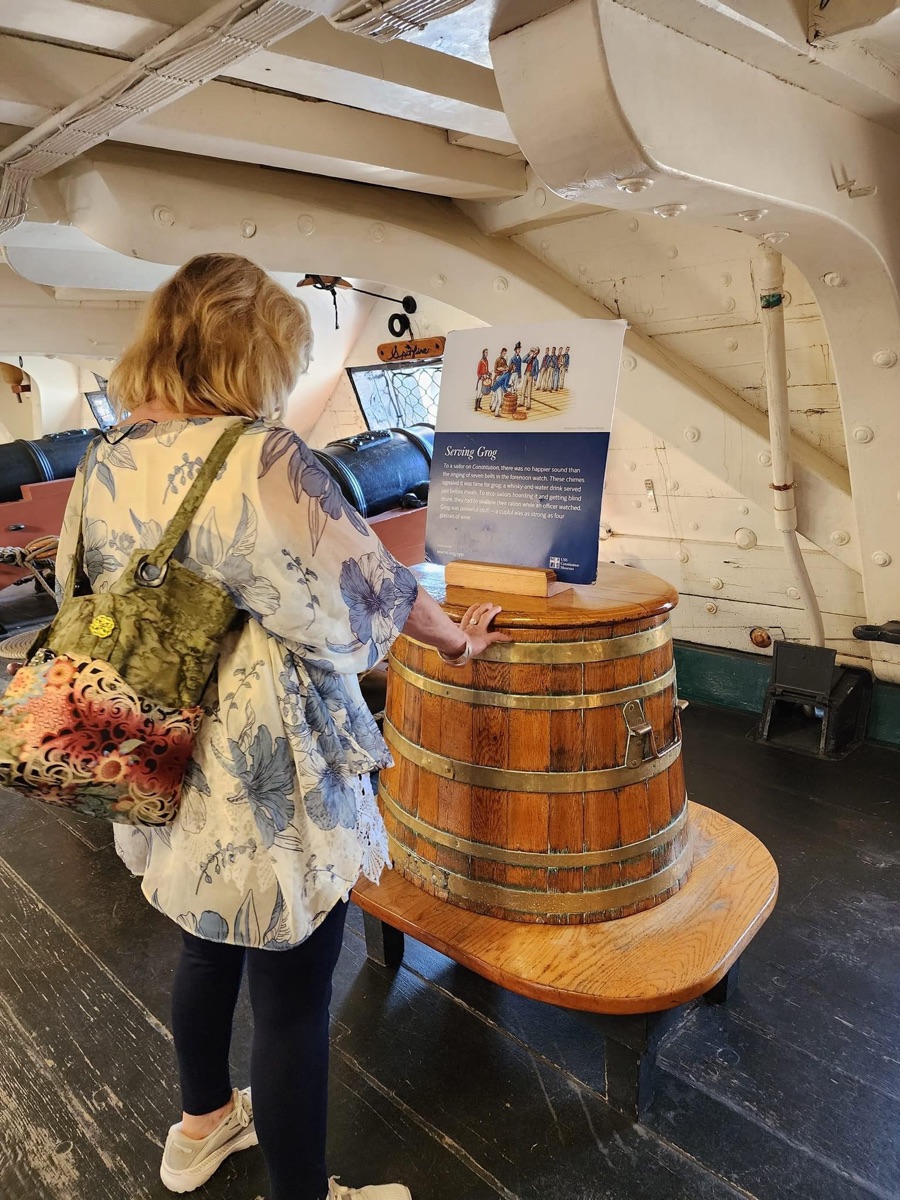
"I'll drink to that!"
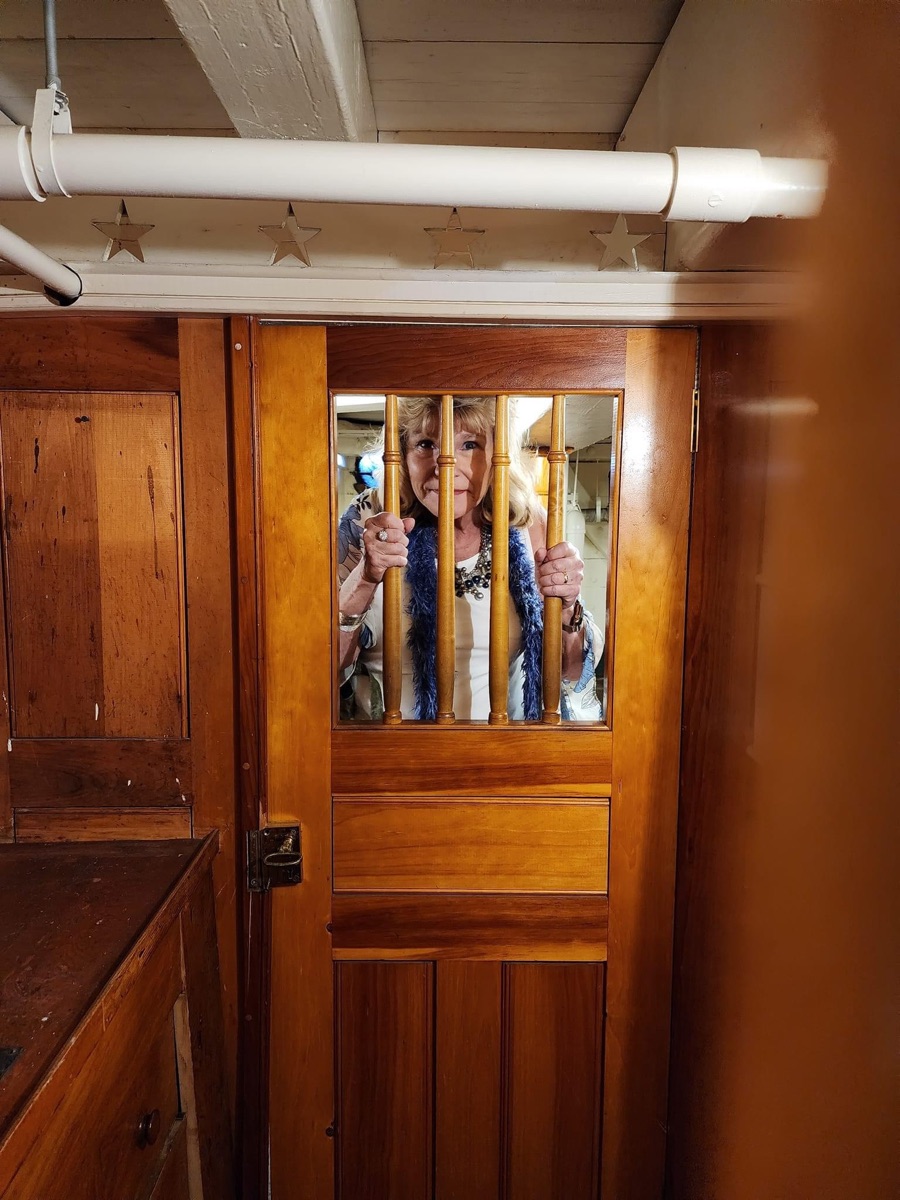
A wee to much grog ma'Lady!
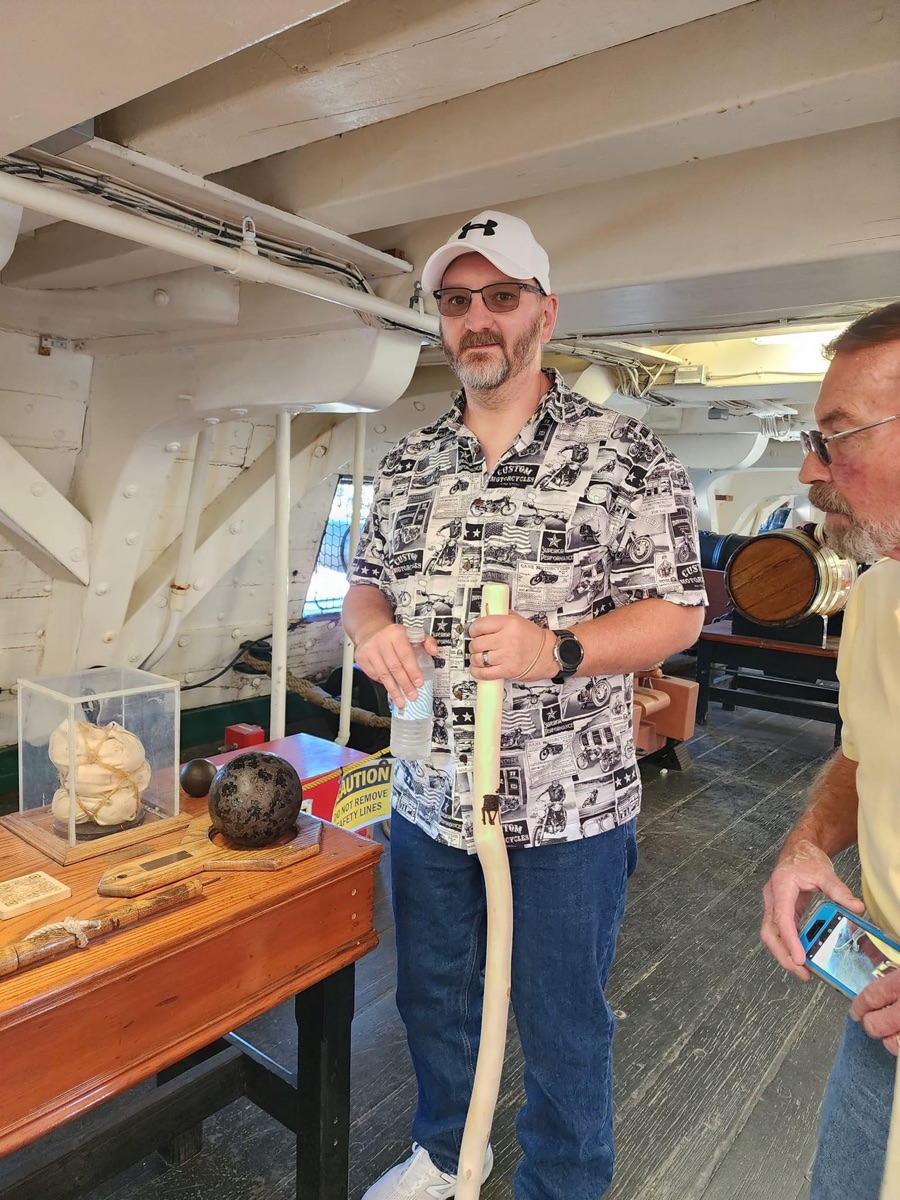
"What were the 1700 submarines like Mark??"
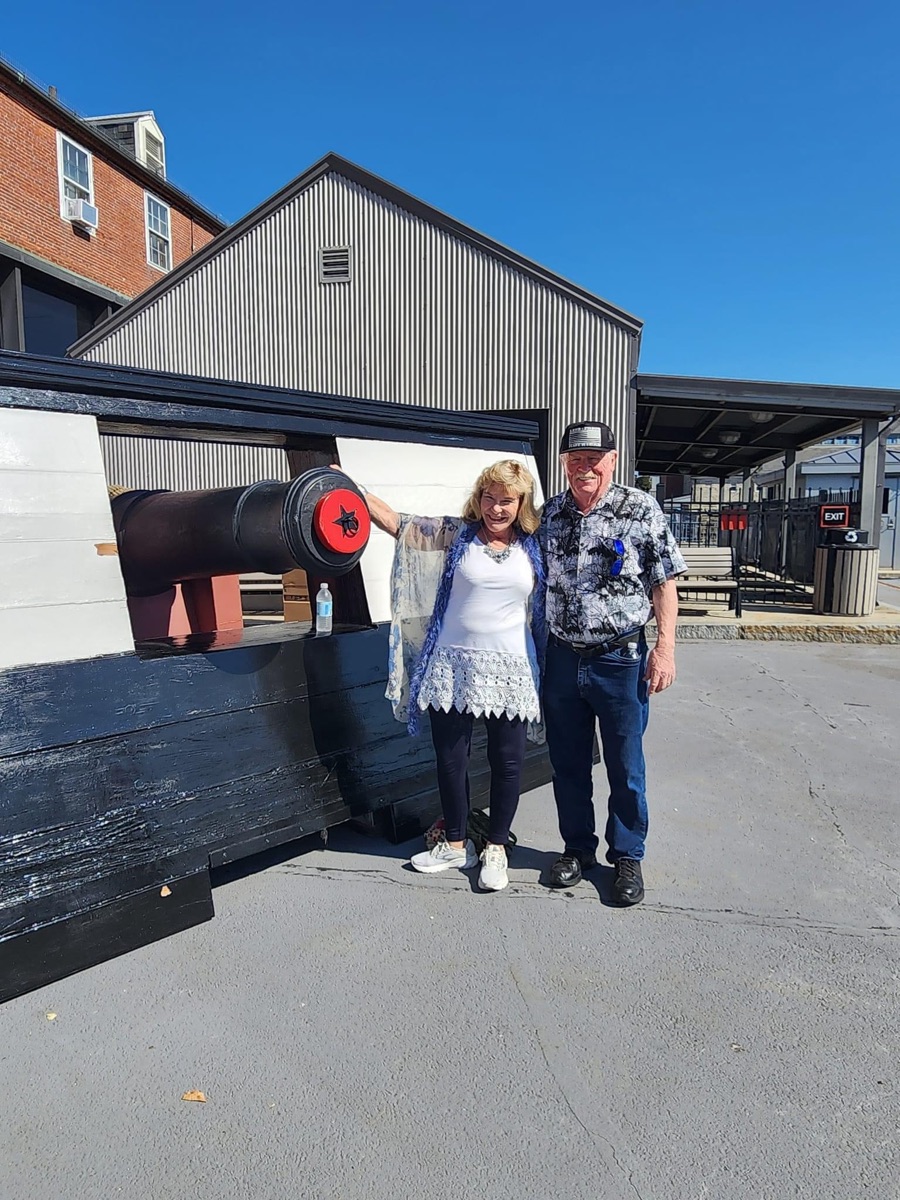
Ready to head for Salem and lunch!
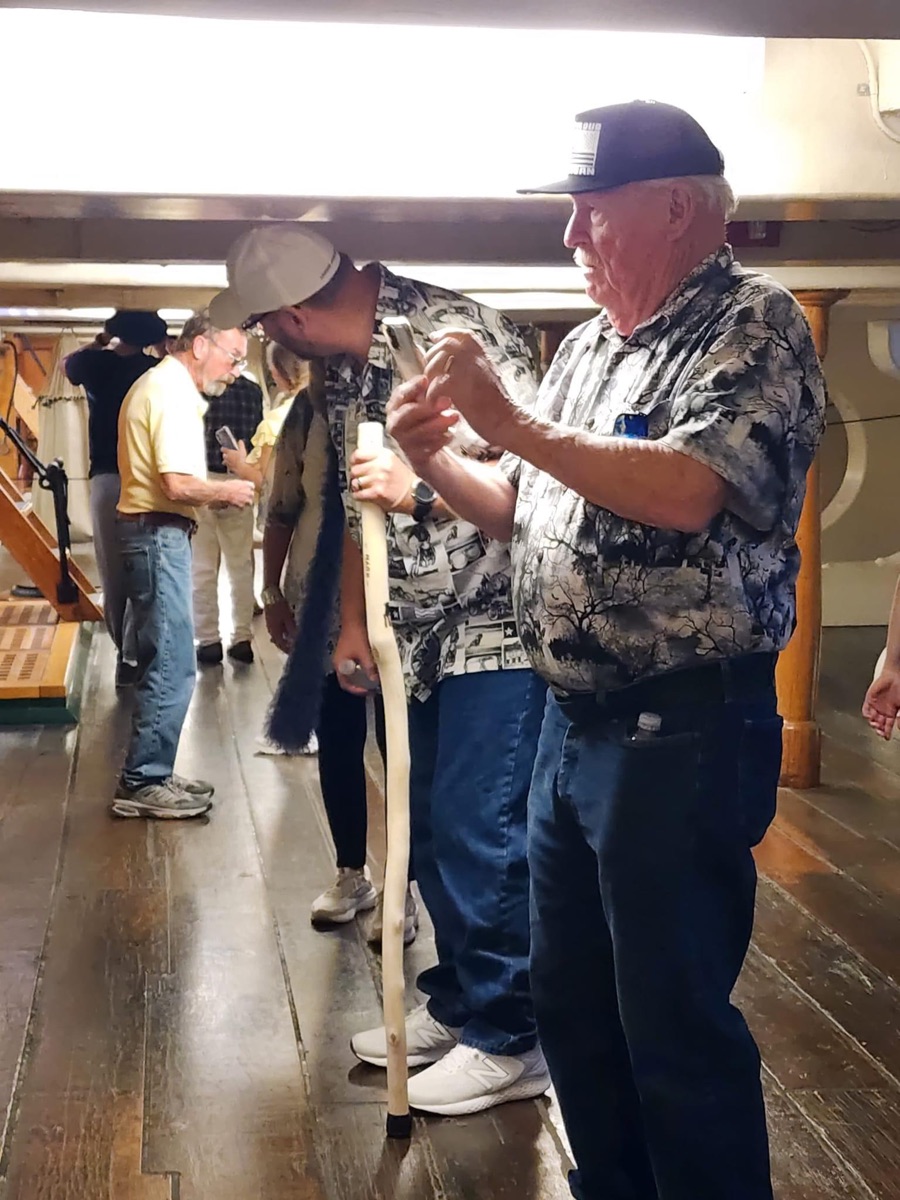
We are ready to go upstairs! Where is the elevator?

The grille made the gun deck quite bright!

Who had bilge duty??
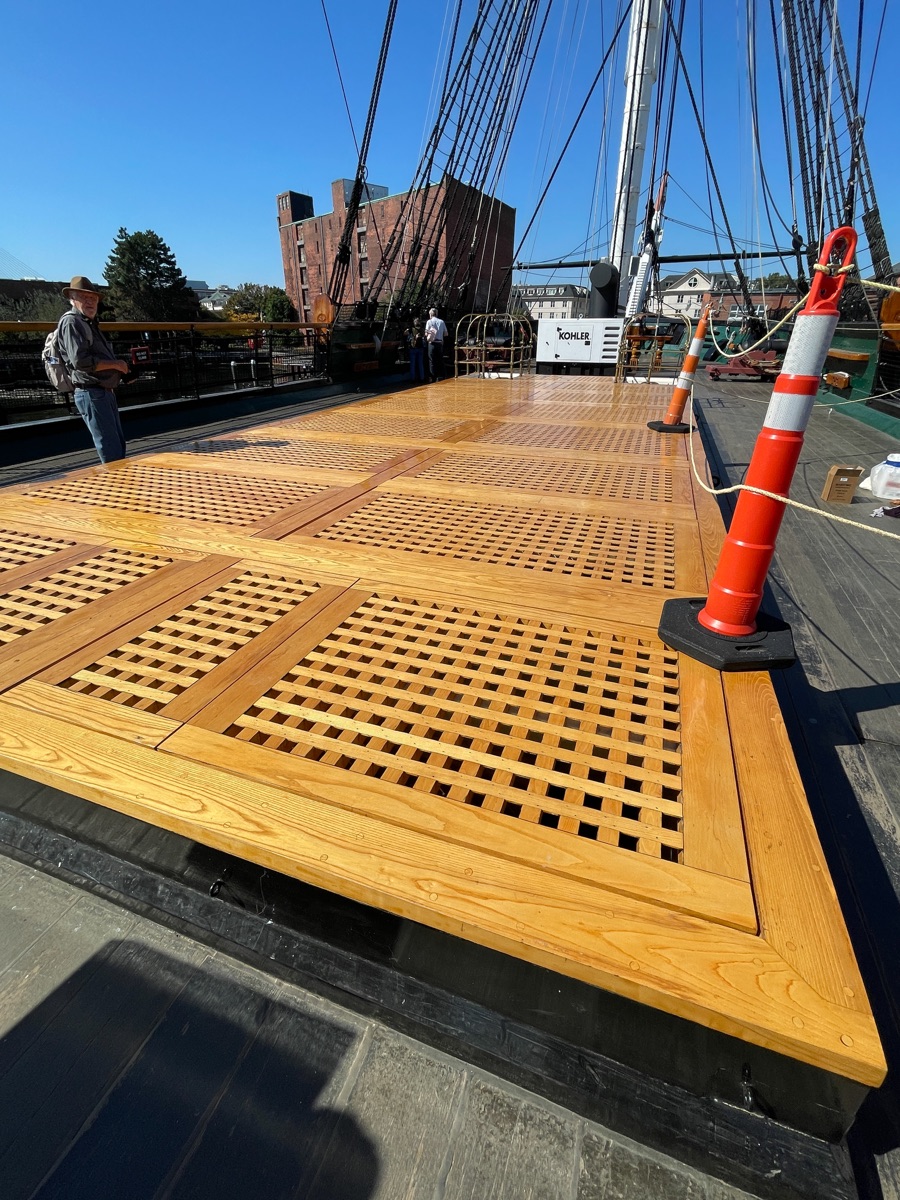
The lighting system worked quite well in the daytime.
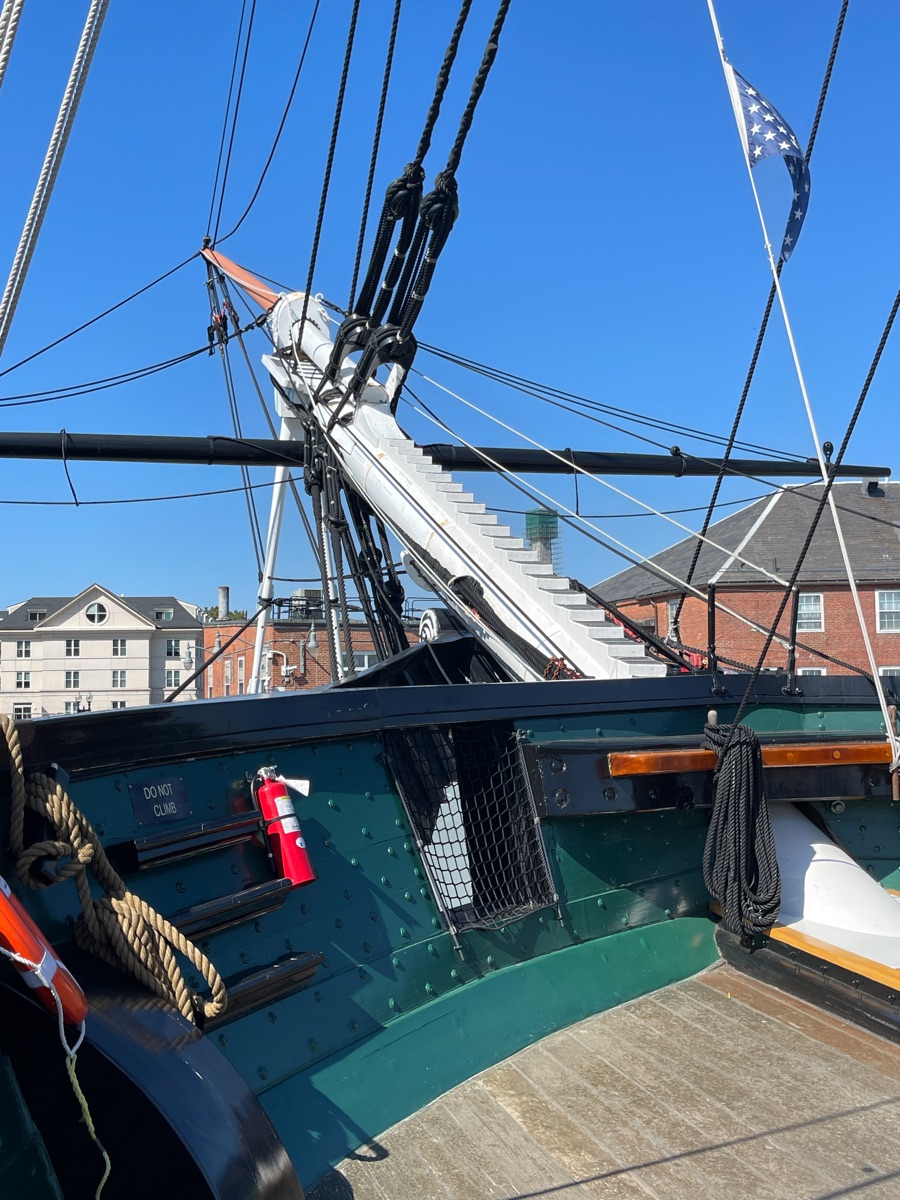
It so well maintained.
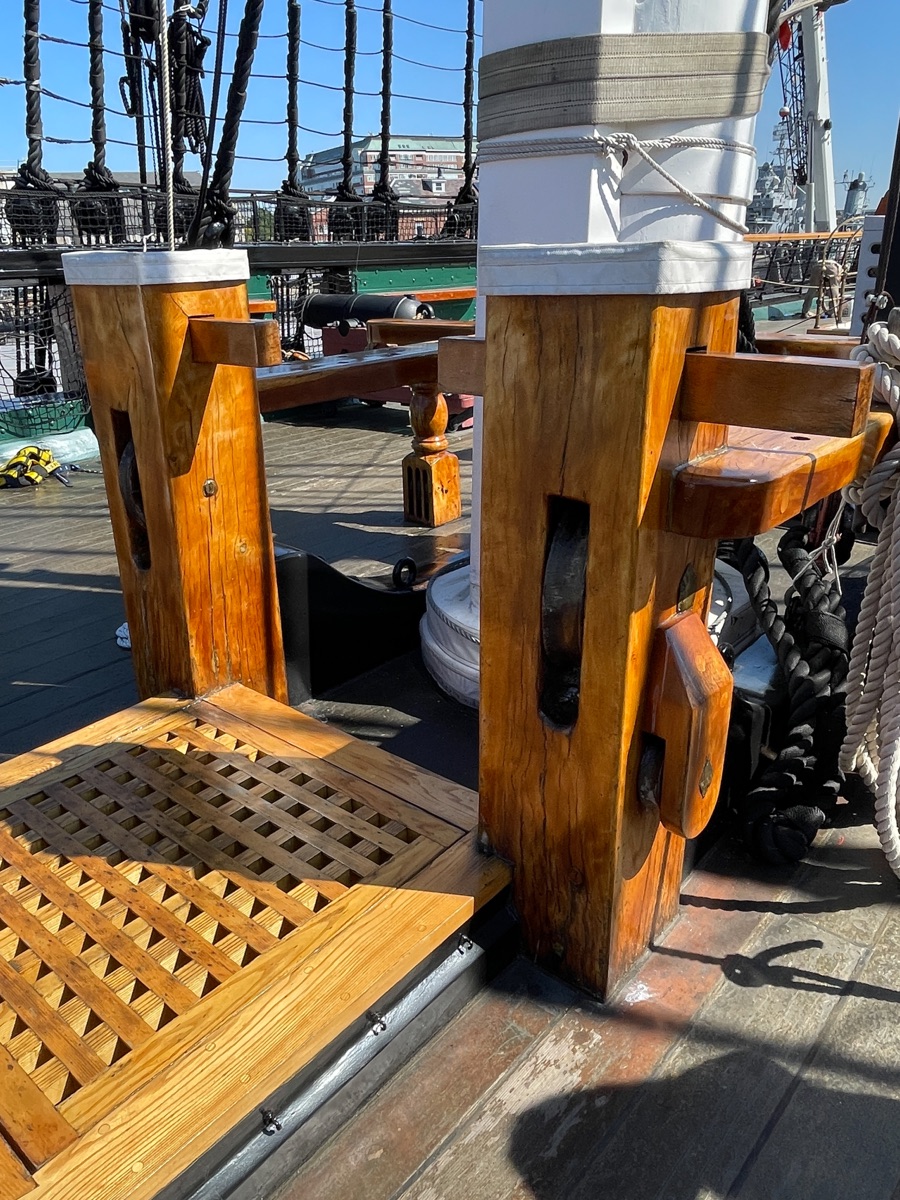
The coatings on the wood protects the wood for a while. Only 10% of the original materials on the Constitution are original, the remaining wood had to be replaced as it got older.
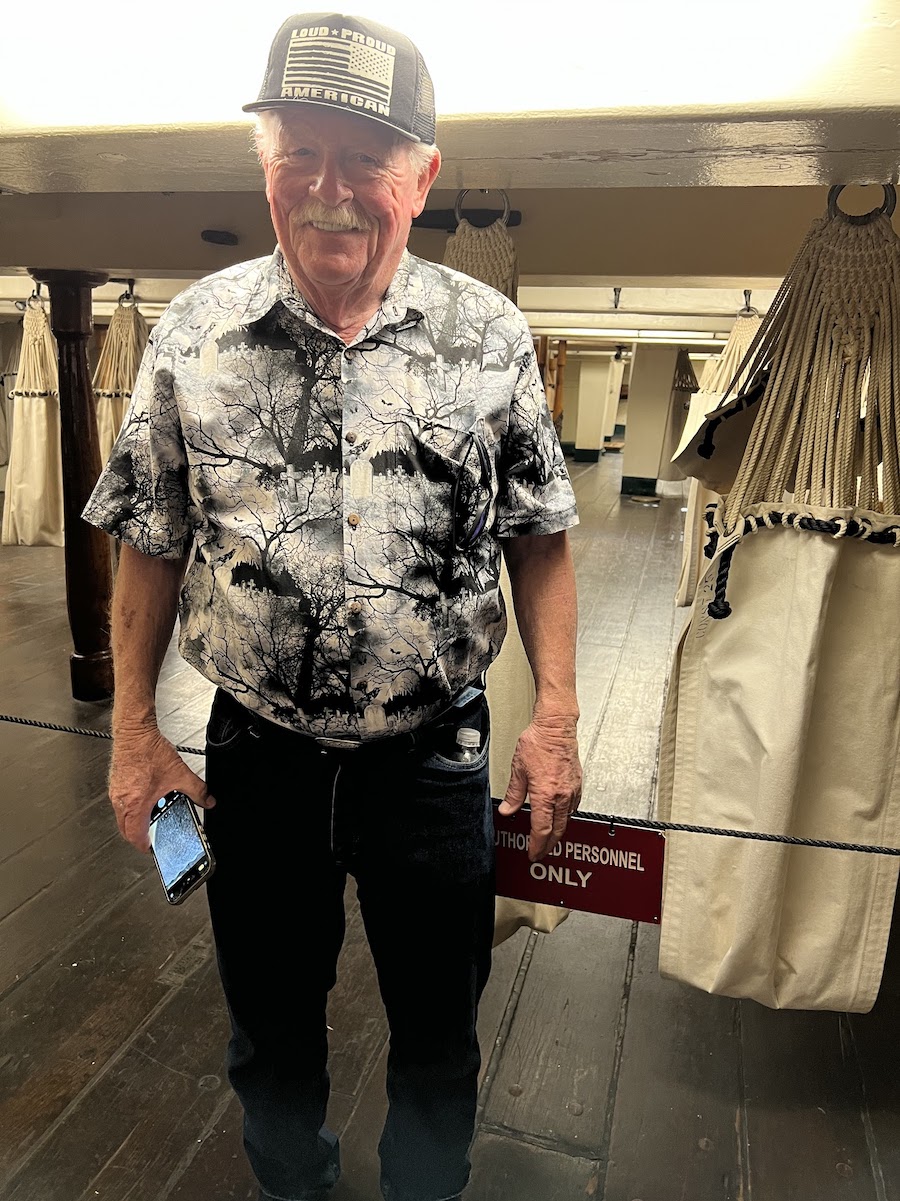
They tried but I would not get into the bag!
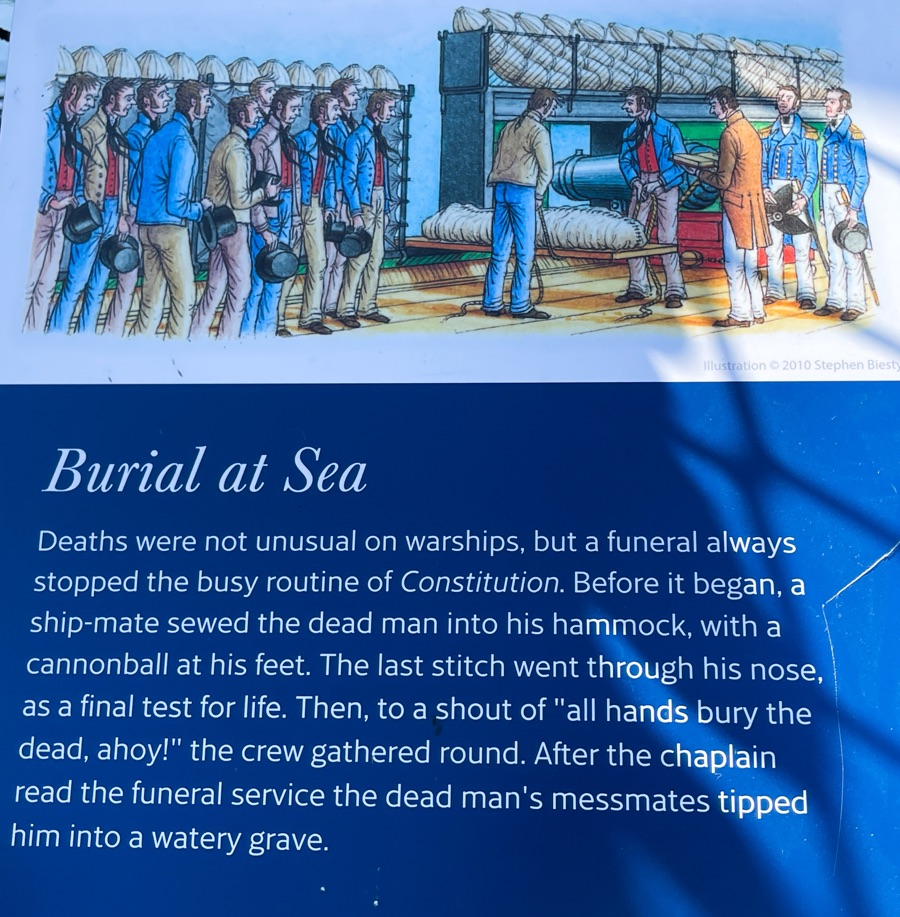
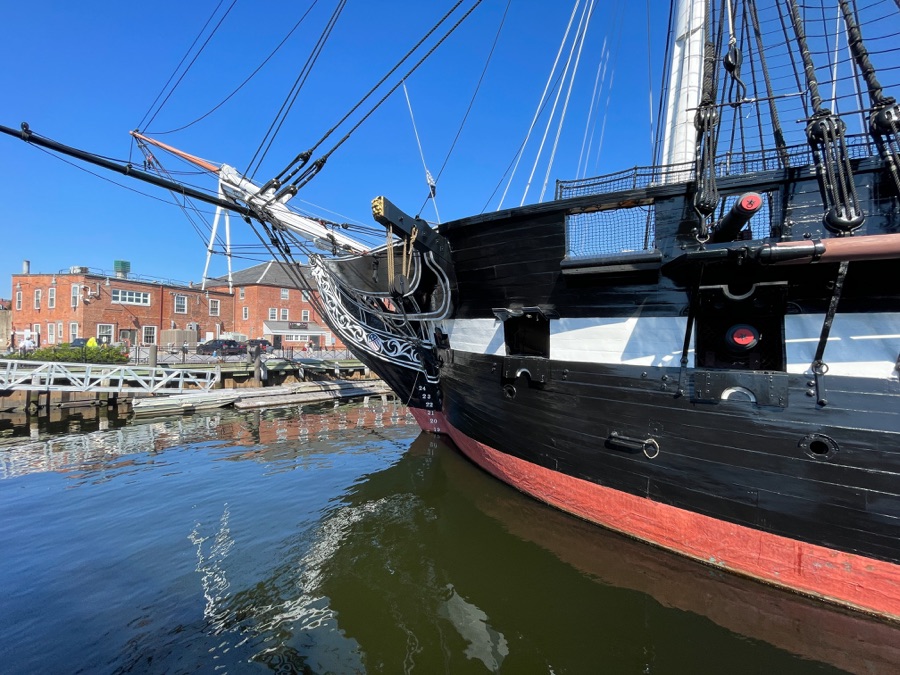
Good bye and we will see you again.
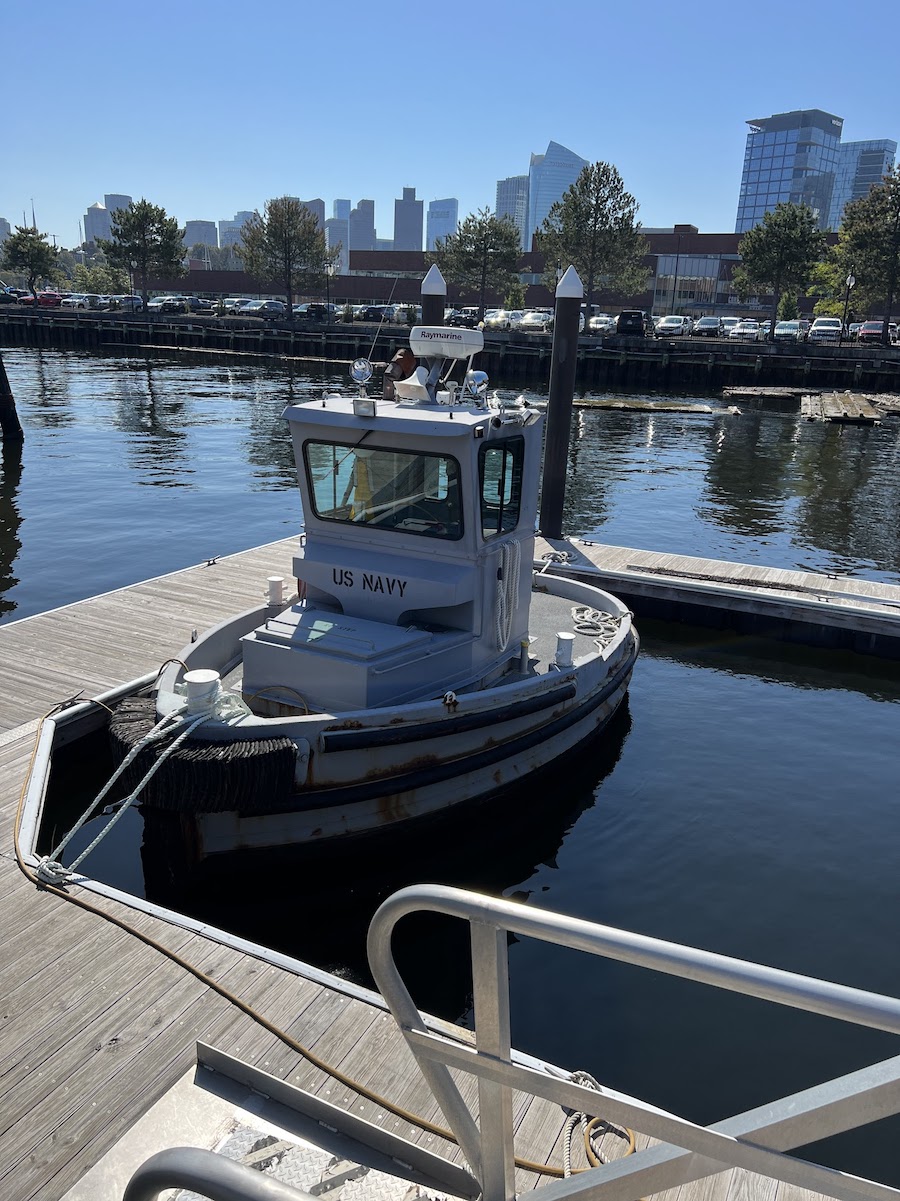
Mary loved the little tug boat!

Also framed!
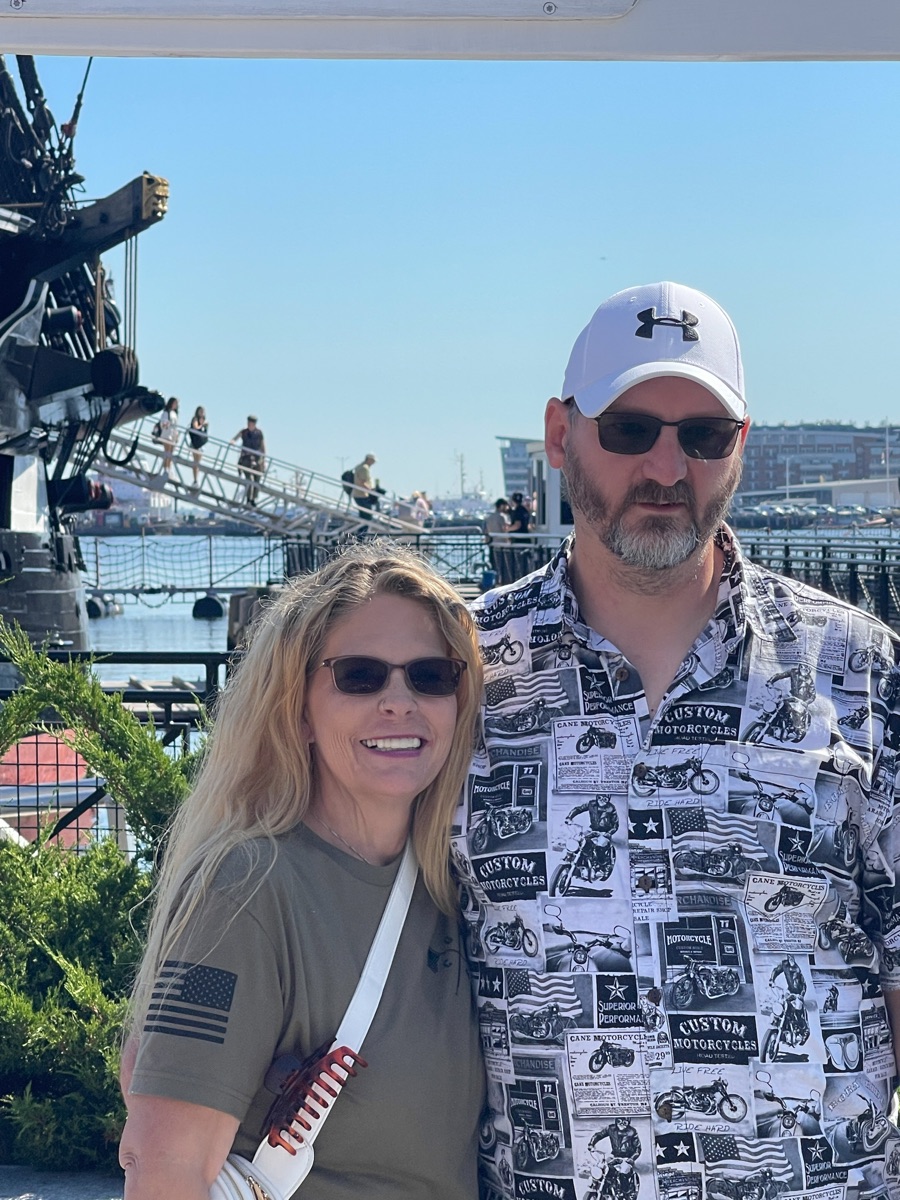
Colleen and Mark are a fun couple.
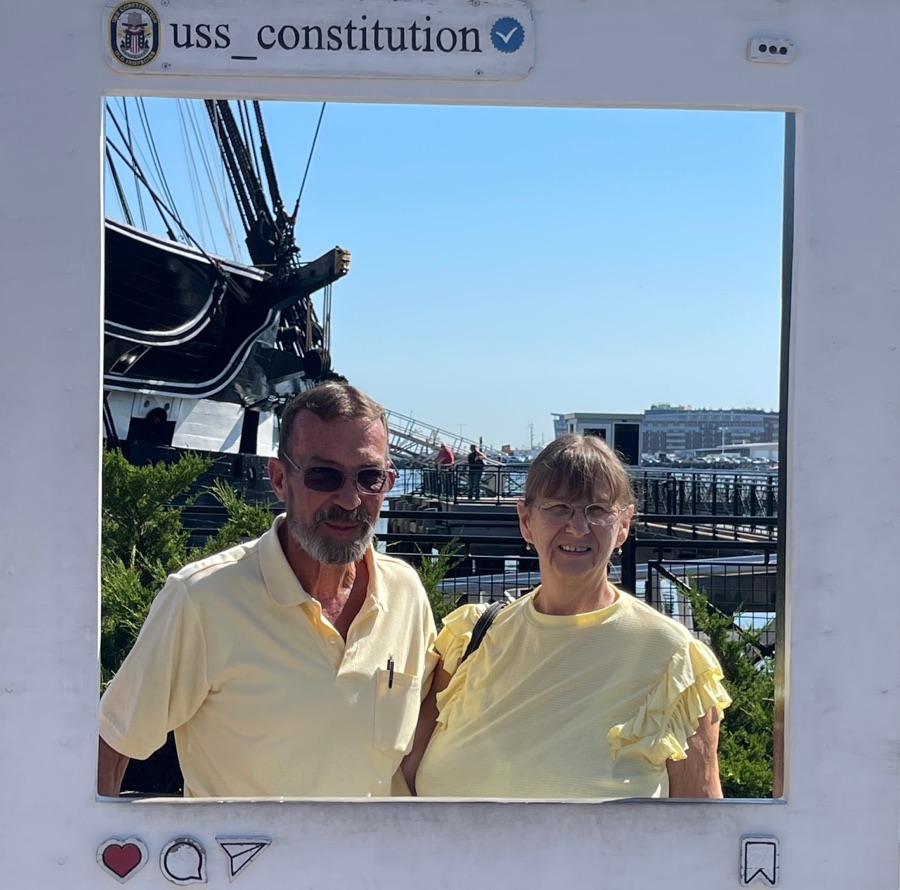
They didn't do it, really, they didn't! Rick and Cuba are being framed!
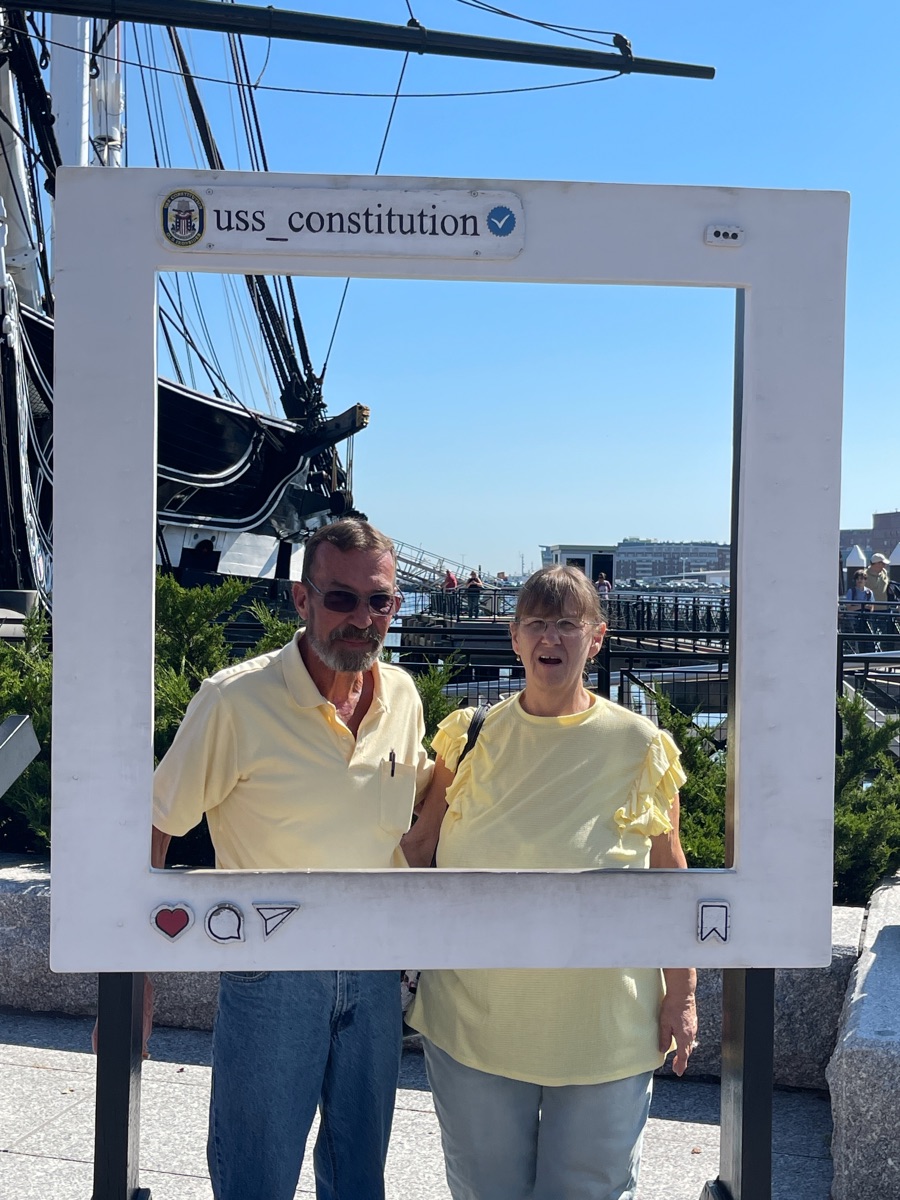
Framed!


We tried a couple of places in Boston but the traffic was so bad we gave up. We did drive by Cheers and it was buried in a mess of scaffolding. We headed up the highway for lunch instead.

We had a hard time seeing the sign

Food pictures are mandatory; Mark says a short prayer before visiting Salem!

Everyone looked so solemn!

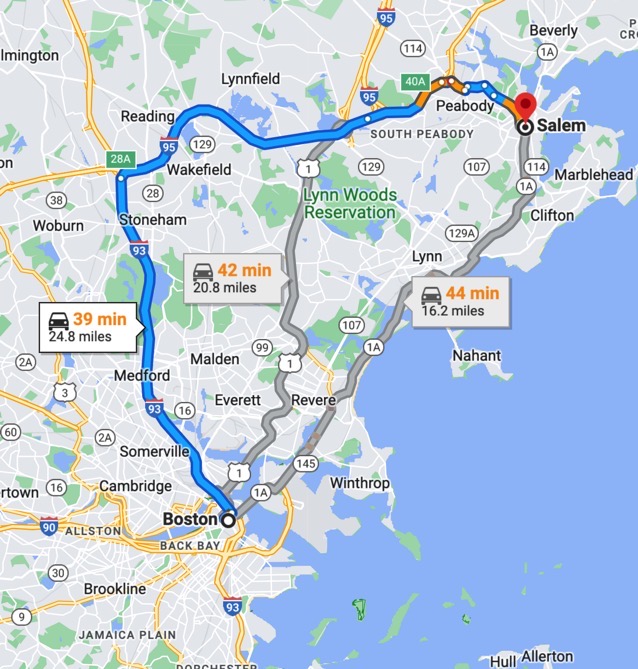
We were in the back seat laughing ourselves silly so we
have no idea which route Colleen took!
Did You Know? - Salem is a city on the north coast of Massachusetts above Boston. It's famous for its 1692 witch trials, during which several locals were executed for allegedly practicing witchcraft. Landmarks from this episode include the Witch House, the former home of a trial judge. The Peabody Essex Museum has a massive collection of global art and artifacts, including a rebuilt Qing-era Chinese house.
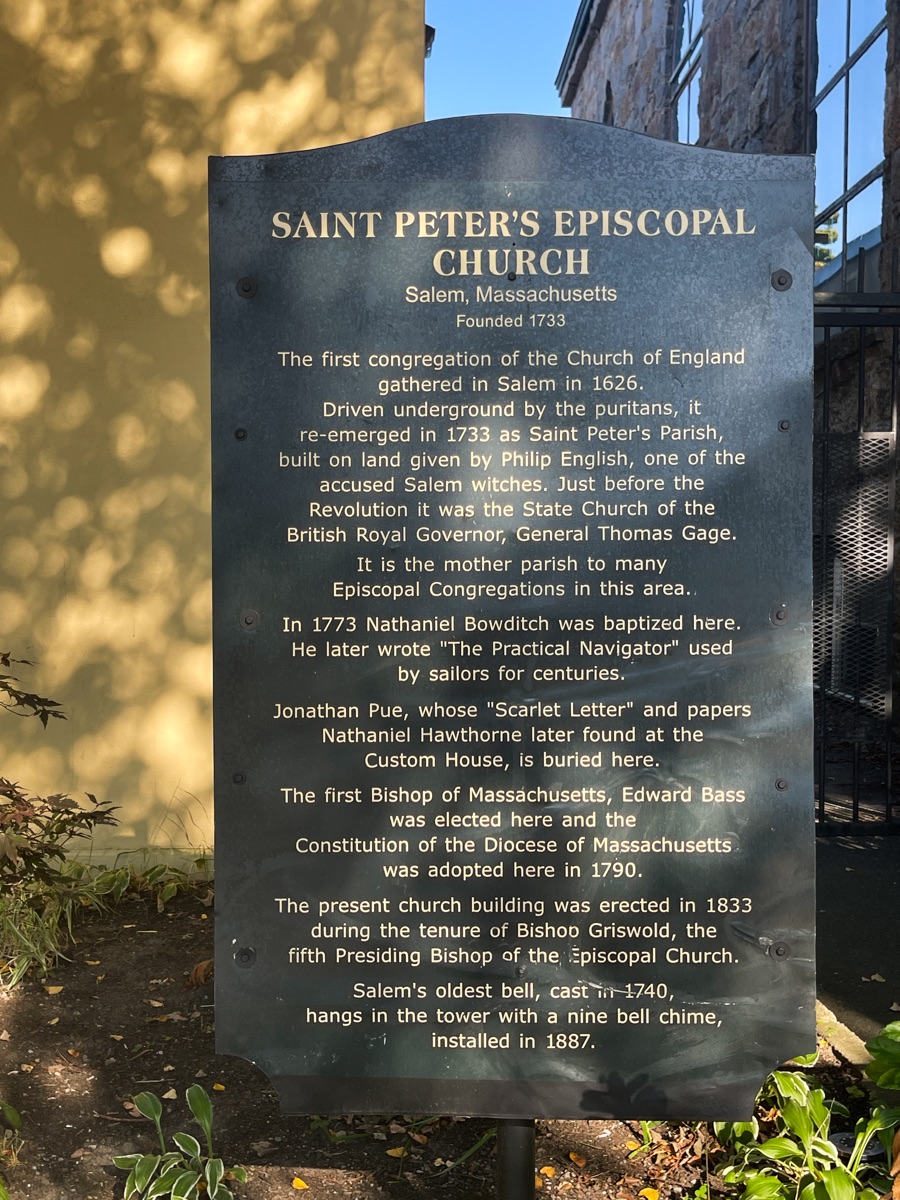
Love history? This is the place to go!
Did You Know? - The infamous Salem witch trials lasted for approximately one year between 1692 and 1693.
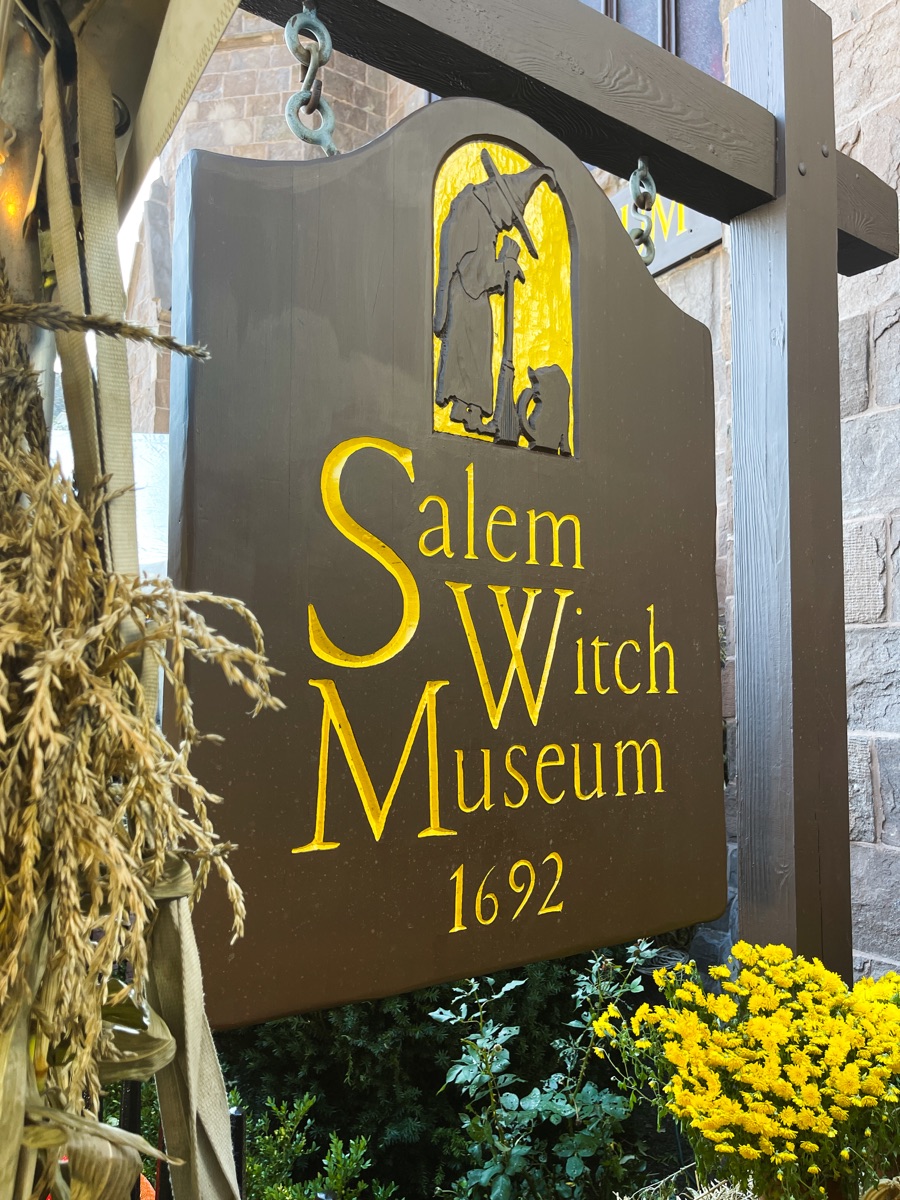
We watched the hour presentation!
Did You Know? - The afflicted were those believed to be tormented by witchcraft. Beginning in January of 1692, these individuals showed alarming symptoms of a mysterious illness. They made strange, foreign sounds, huddled under furniture, writhed in pain, and clutched their heads. Those suffering from this affliction were the ones who "cried out" names, accusing others of bewitching them. Though the initial afflicted were primarily adolescent girls, eventually grown women and men also exhibited symptoms of bewitchment.
The accused were those suspected of practicing witchcraft. These people were named by the afflicted, leading to arrests and trials for the crime of witchcraft. As the mysterious affliction spread, those afflicted began to complain disembodied spirits were stabbing them, choking them, and jabbing them with pins. These disembodied spirits, or "specters," were soon identified as real individuals living throughout Essex County. This would culminate in the arrest of 150-200 individuals.

Hang 'em high!
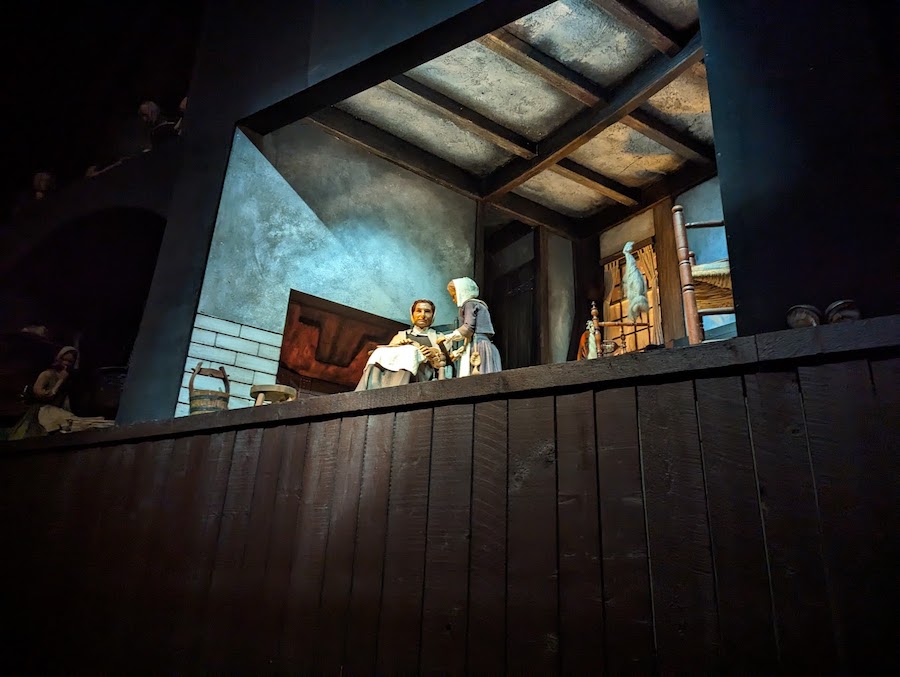
As usual, the teenagers caused the problem!
Did You Know? - The city ran a public competition to design the Salem Witch Trials Memorial, and it was officially dedicated in 1992 on the 300th anniversary of the trials.
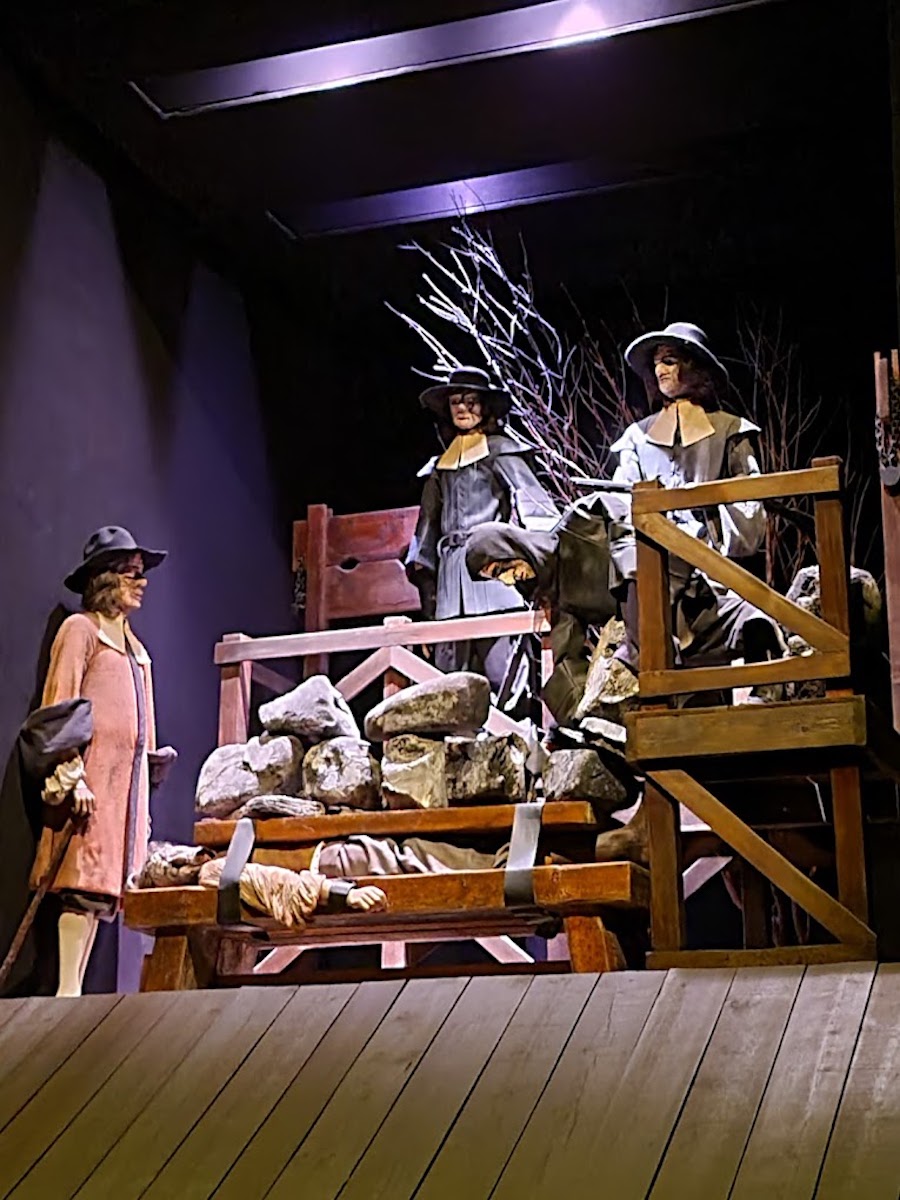
Poor guy was crushed to death!

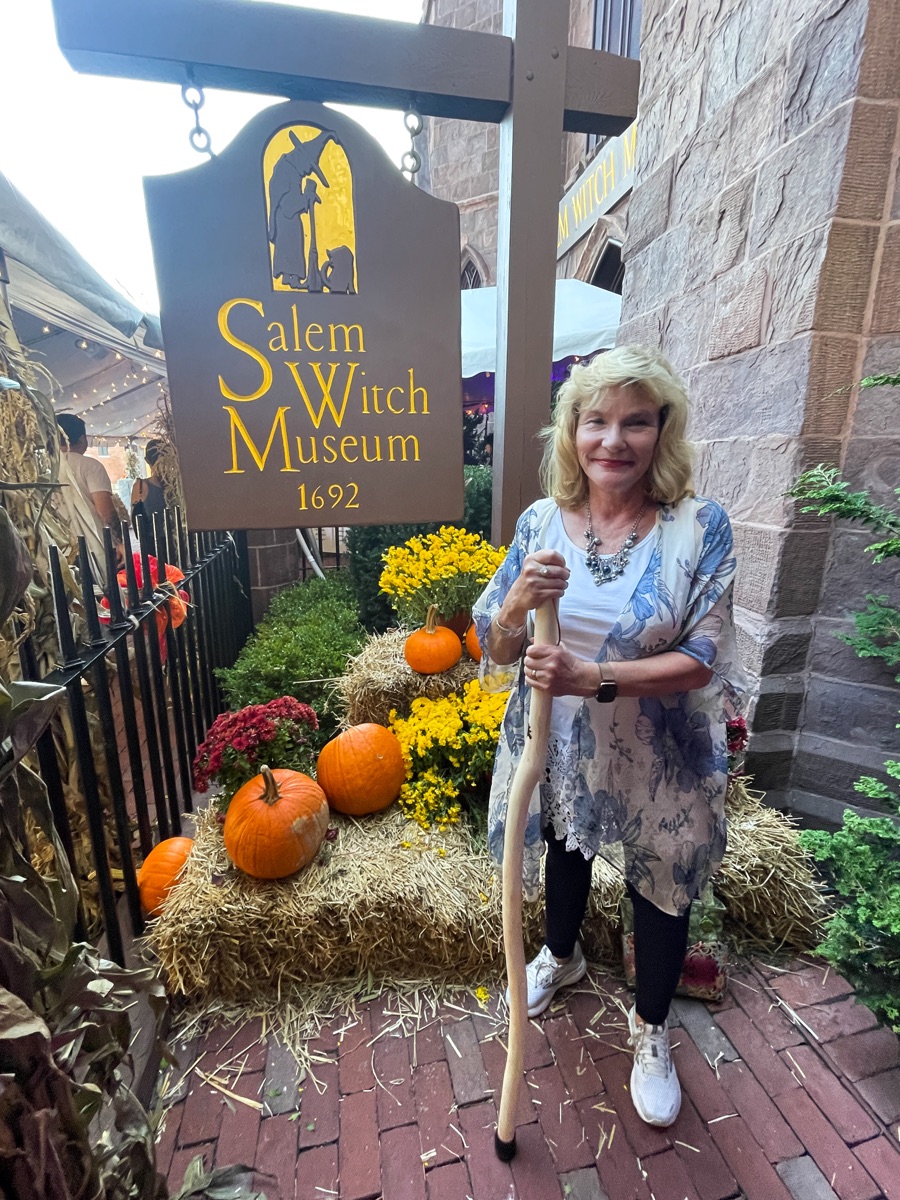
We made it out safely.
Did You Know? - In seventeenth-century New England a witch was believed to be an individual who sold their soul to the Devil. In return for this sacrifice, the Devil was thought to provide this person with supernatural powers that could be used to wage war against faithful Christians. As it was believed any person could become a witch, man, woman, or child, these frightening creatures were understood to by hiding in plain sight and could be blamed for a range of misfortunes.
At this time, Massachusetts Bay Colony operated under English law, which defined witchcraft as a capital crime publishable by death. Though a serious criminal offense, witchcraft suspicions rarely escalated to trial in colonial New England.
In fact, in the 25 years leading up to the Salem witch trials, only one person was executed for witchcraft in Massachusetts. There is no contemporary evidence that indicates anyone accused of witchcraft in Salem was in fact a witch.
Instead, it is clear those who confessed did so under extreme pressure and fabricated elaborate stories under duress. It is interesting to note the practice of folk magic persisted in both England and New England throughout this period.
Though frowned upon by the church, many people continued to use charms and old folk remedies in an effort to cure illnesses, find lost objects, protect their homes, or find witches hiding in the community.
These practices were not necessarily associated with being a witch, a much more insidious crime, and the use of simple folk magic rarely led to a witchcraft accusation.

We didn't "Hang Around"
